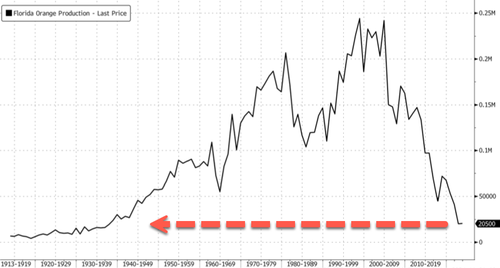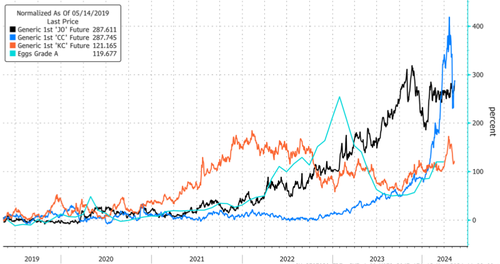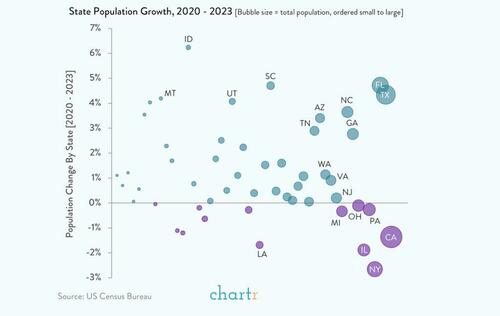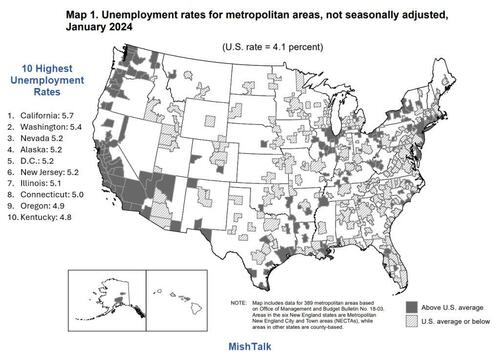Certainly, it is difficult to make the demands of the Gospel understandable to secularized people. But this pastoral difficulty must not lead to compromises with the truth.
Distinction Matter - Subscribed Feeds
-
Site: Mises InstitutePolitical and academic elites have successfully convinced the public that they should fear private enterprise. However, people really should fear an out-of-control government.
-
Site: Zero HedgeOrange Juice Prices Primed For Breakout After Forecast Warns Brazil Set For Worst Harvest In DecadesOrange Juice Prices Primed For Breakout After Forecast Warns Brazil Set For Worst Harvest In DecadesTyler Durden Mon, 05/13/2024 - 06:55
Breakfast lovers are in for another jolt as orange juice prices surge to near-record levels. A new report released on Friday indicates that Brazil, the leading global exporter of OJ, is facing its worst harvest in over three decades. This alarming development compounds existing issues in Florida's citrus groves, which have been plagued by disease and are experiencing collapsing production levels to the lowest in decades.
Fundecitrus wrote in a note that Brazil will produce 232.4 million boxes—each weighing about 90 pounds—for the growing season this year. That's a 24% collapse from a year earlier and the lowest production levels in 36 years.
"Excessive heat brought stress to orange trees during a crucial period of flowering and early fruit formation between September and November last year. Further hurting output is an increase in citrus greening, a disease that causes fruit to prematurely drop from trees," Bloomberg wrote, commenting on the report.
The report sparked additional fears about a worsening global OJ shortage.
In markets, prices of concentrated OJ futures in New York surged as much as 5% on Friday, closing up about 3% to $394 and only 8% off the record high of $425.
Sliding production in Brazil could soon impact US retail prices at the supermarket, considering Florida has yet to stage a significant comeback in production.
In the last year, the US has ramped up imports of OJ from Brazil to mitigate losses in Florida.
Don't worry. Federal Reserve Chair Jerome Powell has everything under control on the food inflation front, as the prices of OJ, coffee, eggs, and cocoa have hyperinflated.
Watch OJ futs in NY into the new week.
-
Site: southern orders
This is a photo from Vatican News’ website this Monday morning showing a man being carried out of the flood waters in Brazil. Who do you think that is? Please pray for those suffering from natural disasters throughout the world.
-
Site: Zero HedgeWho Are We Protecting, And From What?Tyler Durden Mon, 05/13/2024 - 06:30
Authored by Omid Malekan via Medium.com,
Gambling is increasingly legal in the US: Casinos, sports betting, the lottery, and so on. The economic benefits of most forms of gambling are limited. There is some job creation and collection of additional taxes, but these benefits come at the expense of players.
Put differently: Casinos are highly profitable and the lottery helps fund the government because players are guaranteed to lose in the long run. Incentives are misaligned.
Like gambling, investing in startups and “alternatives” like venture capital or hedge funds is also risky. But unlike gambling, this type of risk is economically productive. It provides capital to entrepreneurs and liquidity to markets.
A big part of America’s economic success is our ability to finance startups and our efficient capital markets, often described as “the envy of the world.”
Just as importantly, the incentives from this kind of risk taking are aligned. If a startup founder makes money, so do his investors. If a VC fund manager collects carry, it’s because she made her LPs a profit.
Except for certain age restrictions, gambling in the U.S. is open to the general public. There are no tests for the “sophistication” of a blackjack player or the annual income of a sports bettor.
The most popular form of gambling is the lottery. It has the worst odds because it is a government monopoly. It’s popular because it is heavily marketed, particularly to poor people. That’s why economists call it a regressive tax.
Except for certain hard to satisfy (and economically unfeasible) exemptions, investing in startups or alternative investments is restricted to the wealthy. Accredited investor laws require startup founders and fund managers to only accept money from so-called “sophisticated” investors.
But they don’t require prospective investors to take a test or demonstrate experience, they simply ask how rich they are. Accredited investor laws are based on the classist assumption that rich people are smart and poor people are stupid.
Never mind the history of Enron, Lehman, Madoff, SVB, and every other major collapse in recent memory, all of which featured one group of affluent people interacting with others.
The U.S. government assumes that a billionaire boomer who inherited all his wealth is more “sophisticated” when investing in AI startups than a 23 year old with a degree in machine learning.
That same government has no problem with the 24 year old blowing all his money on fantasy football or the Powerball. There’s now even a lotto app.
Less than 20% of Americans can qualify as accredited investors, but over 60% of Americans have gambled in the past year.
Wealth disparity has grown significantly in the past 20 years, in part because investments have outperformed income. Put differently: those who derive their wealth from their assets have outperformed those who do so from their labor.
Within the investment landscape, so-called “private markets” have outperformed public ones, in part because different government regulations like Sarbanes Oxley incentivized successful startups like Facebook (which 80% of people couldn’t invest in at the outset) to go public later than their predecessors.
This phenomenon was aided by the growth of venture capital and growth equity funds (which 80% of people can’t become LPs for) and the rise of secondary trading platforms for private shares (which only 20% of people can use).
Given the demographic breakdown of wealth in America — now skewing in favor of older people — this phenomenon also has an intergenerational component.
Like most demographic trends, the rise of economic inequality has many contributing factors. But government policy clearly plays a role.
The U.S. government wants ordinary (and younger) Americans to do risky things that are guaranteed to lose money while simultaneously barring them from doing risky things that may generate a positive return.
This is not an accident. Everything that I’ve argued here is easy to verify and regularly discussed in policy circles. That makes it a deliberate choice.
Ironically, the one exception to this phenomenon has been crypto, at least until recently. Coins like Bitcoin and Ether are the only risk assets that were available to the general public and outperformed over the past decade.
Their orthogonal arrival, technical complexity, and niche communities made them a far more likely investment for a smart 24 year old than a billionaire boomer. Their decentralized nature also meant that access was generally ungated.
The data shows that younger people — who own disproportionately less equity and real estate — own disproportionately more crypto. The same goes for minorities like blacks.
The U.S. government is now trying to put an end to all of this. Agencies like the Securities and Exchange Commission, which is led by a 66-year old centi-millionaire, are trying to force crypto into the same accredited investor laws that held back a generation.
Mr. Gensler made most of his wealth becoming a partner at Goldman Sachs at a time when it was a private company. He’s the prototypical winner of the status quo.
Today, thanks to the SEC’s crackdown, virtually all crypto projects either restrict early investments to accredited investors or exclude Americans altogether.
Some don’t even let American’s collect airdrops, free money that could make a major difference in the financial life of a young American who is sophisticated enough to deposit Lido staked ETH into EingenLayer, but not Sophisticated enough to be rich.
This too is by design.
America’s current disposition towards gambling, investing, and crypto is a socioeconomic disaster. It’s bad economic policy and deeply immoral.
-
Site: RT - News
Using NATO air defenses against Russian targets would be “playing with fire,” Rolf Mutzenich believes
Shooting down Russian missiles over western Ukraine by using air defenses stationed on NATO territory would be extremely dangerous, a top German lawmaker has warned.
On Saturday, a group of German MPs from the opposition and ruling coalition said they supported targeting Russian missiles and drones over Ukraine by using defenses based in Poland and Romania.
MPs argued that establishing a 70-km-wide safe zone on the Ukraine-EU border would relieve pressure on Kiev’s air defenses. They added, however, that the West’s current priority must be to supply Ukraine with as many weapons as possible. They also acknowledged that the issue would have to be approved by NATO.
In an interview with Tagesspiegel on Sunday, Rolf Mutzenich, who chairs the Social Democratic Party (SPD) parliamentary group in the German Bundestag, vehemently opposed the idea.
Read more German MPs want to shoot down Russian missiles over Ukraine
German MPs want to shoot down Russian missiles over Ukraine
“A defense of Ukrainian airspace by the Bundeswehr would immediately turn us into a warring party and would require a mandate from the Bundestag,” he explained, adding that the SPD would not support the idea. Mutzenich also argued that using NATO air defenses against Russian targets would be “playing with fire.”
Moscow has for decades viewed the US-led military bloc’s creeping expansion towards its borders as an existential threat. Russian President Vladimir Putin has said Ukraine’s potential membership in NATO was one of the key reasons for the current conflict, while failed peace talks early into the hostilities revolved around Kiev’s neutrality.
The debate over deeper NATO involvement in the conflict comes as Russia launches waves of attacks on Ukrainian military and energy infrastructure using long-range missiles and drones. Earlier this month, Ukrainian Foreign Minister Dmitry Kuleba admitted that the strikes had disrupted half of the country’s energy system.
Meanwhile, Ukrainian officials and media reports suggest that Kiev is finding it increasingly difficult to repel or mitigate the effects of these attacks, in part due to delays in Western arms deliveries.
On Monday, the Wall Street Journal reported that Kiev was shooting down a far smaller percentage of Russian missiles than earlier in the conflict, citing an analysis of figures provided by the Ukrainian Air Force. According to the data, Ukraine intercepted only about 46% of Russian missiles in the past six months, compared to 73% in the previous such period. In April, that figure dropped to just 30%.
-
Site: Mundabor's blogThere Is No Innocent Nutcase Cause, Or: The Way The Grievance Industry (And Marxist Propaganda) WorkAs you can read here, it happened again: The patters is always the same: “nutcase group 1 supports nutcase group 2”. Very often, nutcase group 2 will return the favour by supporting nutcase group 1. However, this does not even have to be the case, nor there is any real need to have a high-level […]
-
Site: non veni pacem
Today is the Feast of Saint Robert Bellarmine, and the 107th anniversary of the first appearance of the Blessed Virgin to the seers at Fatima.
– May 13, 1917. When asked by the children who she was and where she came from, the lady said she was “from heaven” and that she would reveal her identity later. She asked the children to come back to the Cova da Iria on the 13th day of the month for the next six months, and she asked them to pray the rosary every day “in order to obtain peace for the world” and the end of World War I.
Saint Robert Bellarmine battled against the Protestant Revolt of the 16th Century. His rebukes of the heretics through sermons and catechisms earned him the title Doctor of the Church.
When the great Italian Jesuit, Robert Bellarmine (1542-1621), was made a cardinal, Pope Clement VIII said of him: “We elect this man because he has not his equal for learning in the Church of God.” Untiring in his powerful opposition to the Protestant enemies of the Church, St. Robert wrote masterpieces of apologetic literature, as well as two famous catechisms. He also won souls through his sermons and lectures, but above all through his ardent prayer and the example of his holy life.COLLECT
“O God, You fortified Your blessed bishop and doctor Robert with remarkable learning and courage to expose the dangers of error and defend the rights of the Holy See. May we grow in love of truth, and may they who have been led astray by falsehood come back to the unity of Your Church through the intercession of Your saint.”Woe to the Prelates of today, with the truth of an obvious antipapacy set before them, yet shunning “may we grow in love of truth,” instead preferring silence and error as souls are led to Perdition. Consider thy Particular Judgment, Cardinals of the Church, your salvation might just depend on it.
-
Site: Zero Hedge'Unusually Aggressive' Anti-Trump Grand Jury In Arizona Went Rogue With IndictmentsTyler Durden Mon, 05/13/2024 - 05:45
The Arizona grand jury that recently indicted 18 people for allegedly trying to help former President Donald Trump overturn the results of the 2020 election with so-called 'fake electors' went completely rogue and took 'aggressive steps to haul in witnesses,' to the point where they 'even brought charges against some' who were told by prosecutors that they weren't under investigation, Politico reports.
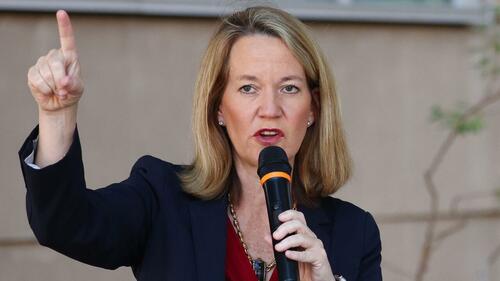 Arizona Attorney General Kris Mayes (D)
Arizona Attorney General Kris Mayes (D)
Their efforts ultimately resulted in a 58-page indictment which has ensnared various national and state Republicans - including one of Trump's current top advisers, and several individuals who were previously in his orbit - with felony charges. Trump himself was listed as an unindicted co-conspirator.
Documents reviewed by POLITICO reveal that at least two of the 18 people charged — former Trump lawyers Jenna Ellis and Christina Bobb — were assured by prosecutors that they were not targets of the probe, only to learn that the grand jury indicted them anyway. In fact, a letter that a prosecutor sent to Ellis just days before the indictment appeared to significantly understate her legal jeopardy.
One witness who testified before the grand jury said a faction of the panel drove intense questioning that exceeded the limited scope that prosecutors had publicly acknowledged. The probe was led by the office of Arizona Attorney General Kris Mayes. -Politico
Mayes, a Democrat who replaced a Republican in January 2023, has been accused of politically motivated lawfare - however Politico's sources say that the grand jury was 'surprisingly independent' of her prosecutors - and 'sometimes even hard for them to predict.'
"The State Grand Jury was given leeway to conduct an independent investigation, as it is entitled to do by law," said Mayes' spox, Richie Taylor. "I cannot confirm or deny the specifics of grand jury proceedings, and I will note that the investigation remains open and ongoing. I will have to decline to comment further."
Grand juries are empowered to conduct their own lines of questioning in order to reach conclusions which may not necessarily align with the wishes of prosecutors - though they typically defer.
That said, in high-profile cases, they've been known to take on more independence.
"Every high-profile case that I’ve ever had, which is cases that have necessarily attendant publicity, or a public corruption case, or anything else, grand jurors become interested," according to former Arizona prosecutor, Paul Charlton.
Ultimately, the Arizona grand jury investigating the 2020 election indicted former White House chief of staff Mark Meadows, lawyers Rudy Giuliani and John Eastman, and close Trump adviser Boris Epshteyn. It also indicted the 11 Arizona Republicans who falsely claimed to be the state’s rightful presidential electors.
Arizona is the fourth state — after Georgia, Michigan and Nevada — to bring criminal charges stemming from the efforts of Trump and his allies to overturn the 2020 results in states that Biden won. At the federal level, special counsel Jack Smith has also charged Trump himself for the scheme. -Politico
"Not a target" (just kidding!)
Several months after former Trump attorney Jenna Ellis pleaded guilty in Georgia to helping Trump overturn the 2020 election, Mayes' prosecutors had questions - and asked her to appear for a so-called "free talk" interview.
"Ms. Ellis is not a target of the State’s investigation," a prosecutor in Mayes' office wrote to Ellis' attorney on Feb. 20, outlining terms for the interview.
On April 19, the same prosecutor followed up with another letter along the same lines - reiterating that Ellis was not a target.
The interview never happened, and Ellis was indicted anyway by the grand jury.
According to Phoenix criminal attorney Omer Gurion, this is unheard of.
"I have never seen anything like that in any Arizona criminal case that I can think of," he said. "Not one," adding that for a person to go from a "free talk" interview offer to indicted in just four days is "pretty unusual."
Former prosecutor Renato Mariotti agrees, telling Politico: "It’s bad form, and something I would never do as a prosecutor," adding "That said, I’ve practiced criminal law across this country and gone up against prosecutors of all stripes, and I’ve learned there are many prosecutors who do things I would not do."
"A Level Of Aggression That Caught Me Off Guard"
One of the witnesses interviewed by the grand jury told Politico that there was a serious difference between the tone set by prosecutors, and the grand jury. The witness, who received immunity, was told to expect around an hour of questioning over the boilerplate details of the probe.
Instead, he got a three-hour grilling that was 'sometimes pointed and accusatory.'
It was "a level of aggression that caught me off guard," said the witness -adding that one juror "seemed to be the leader of the ‘indict them all crowd’ and asked ‘pointed but specific questions.’"
Another juror, who made no effort to hide his political bias, asked "more high-level questions" such as "How could you even talk to these people? What were you thinking?"
Other jurors took a softer tone.
Another smaller faction of grand jurors consistently reframed the questions of the more aggressive jurors and seemed to be more skeptical of the angle they were taking, the witness recalled, noting that this group was visibly “rolling their eyes, heavy sighing, shifting uncomfortably.”
One grand juror also wanted to know what the witness could possibly have been thinking in the weeks after Trump’s defeat. The witness wasn’t a target but left the room surprised by the tenor of the grand jury’s questions and feeling like a “punching bag.”
And after the grilling was over, the witness said, a prosecutor offered a sheepish apology for its unexpected intensity. -Politico
According to the report, witnesses who plead the 5th are generally excused from appearing, but in this case, grand jurors insisted they appear in person to do so.
-
Site: Crisis Magazine

I hate the news but am invariably drawn toward it for professional reasons. I alleviate the angst by enjoying the absurdity of so much of it. For instance, within the last week, we learned that more student debt will be “canceled” by the Biden administration. It’s only another $6 billion for those who attended the Art Institutes, a system of for-profit colleges. The administration thinks that…
-
Site: Crisis Magazine

The idea of a national Eucharistic revival is a great thing. We can and should emphasize the Eucharist, the “source and summit” of the Catholic faith (Sacrosanctum Concilium 11, 14). We can and should bear witness to our faith that the Eucharist truly is the presence of Christ, and everything that presence means. But there is a note missing in the national discussion…
-
Site: RT - News
The incumbent US president is “only good at cheating on elections,” the Republican challenger told supporters
The White House has been infiltrated by “enemies from within,” former US President Donald Trump has claimed in a campaign speech, while lashing out at “crooked” Joe Biden.
“Joe is weak. He’s only good at cheating on elections – but it’s not him, he’s surrounded by fascists around the Oval Office,” Trump told a crowd of supporters in Wildwood, New Jersey, on Saturday.
”The Democrat Party is becoming radicalized. It’s becoming radical left and they’re going to lose our country,” he predicted.
Without naming names, Trump said administration’s “enemies from within” are more dangerous for America than foreign adversaries.
”Russia and China we can handle, but these lunatics within our government that are going to destroy our country and probably want to,” he claimed.
The “fascist” label has also been used by high-profile Biden supporters against Trump, with some Democrats suggesting that if he returns to the White House he could push the country toward dictatorship.
Read more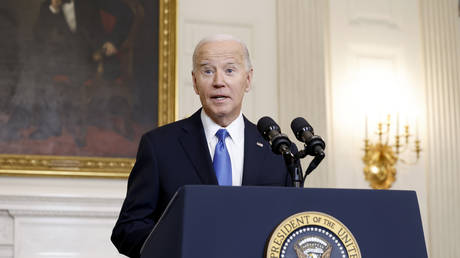 Biden faces impeachment over Israel weapons suspension
Biden faces impeachment over Israel weapons suspension
Hillary Clinton, Trump’s opponent in the 2016 presidential election, claimed on The View program last year that her former rival was showing “dictatorial” tendencies, remarking that Adolf Hitler “was duly elected” before transforming Germany.
“Trump is telling us what he intends to do. Take him at his word. The man means to throw people in jail who disagree with him, shut down legitimate press outlets, do what he can to literally undermine the rule of law and our country’s values,” she said.
Trump’s New Jersey rally served as a change of scenery for Trump, who has been spending much of his time attending court hearings in New York, on charges of using campaign funds to pay hush money to former porn actress Stormy Daniels. The Republican is facing dozens of charges in four separate criminal cases against him.
He told supporters that “radical left Democrats, Marxists Communists and fascists” were behind the indictments, calling his New York hush money case “a Biden show trial.”
READ MORE: Trump wants to ‘kill his opposition’ – Hillary Clinton
Trump has repeatedly claimed that the 2020 election was “stolen.” One of the cases against him relates to his alleged attempt to subvert the election. Hearings are currently on hold pending a Supreme Court decision on whether the former president should be immune to prosecution.
-
Site: RT - News
Some of the IDF’s actions have been inconsistent with international humanitarian law, US Secretary of State Antony Blinken has said
Israel’s airstrikes and ground offensive in Gaza have left more Palestinian civilians dead than Hamas fighters, US Secretary of State Antony Blinken has acknowledged.
During his appearance on the CBS TV news program Face the Nation on Sunday, Blinken was asked if Washington agreed with the recent claim by Israeli Prime Minister Benjamin Netanyahu that the attacks on Gaza have so far resulted in the death of 14,000 “terrorists” and 16,000 civilians.
"Yes, we do,” the Secretary of State replied. “Israel has processes, procedures, rules and regulations to try to minimize civilian harm,” but they “have not been applied consistently and effectively. There’s a gap between the stated intent and some of the results we've seen,” he explained.
Blinken stressed that the Israel Defense Forces (IDF) are fighting “an enemy that hides in civilian infrastructure, hides behind civilians,” which makes it problematic to determine what actually happened in each of the individual incidents.
Read more US unveils results of Israel war crimes probe
US unveils results of Israel war crimes probe
“Given the totality of what we’ve seen in terms of civilian suffering, in terms of children, women, men… who’ve been killed or been injured, it’s reasonable to assess that in a number of instances, Israel has not acted in a manner that’s consistent with international humanitarian law,” he said.
However, the Secretary of State added that it was only an assessment, and that more investigating was needed for the administration of US President Joe Biden to come up with definitive conclusions.
Last week, the State Department released a report that criticized Israel’s conduct of the war in Gaza, but didn’t single out any specific violations that would necessitate a ban on US military aid to its ally.
At least, 35,034 people have been killed and 78,755 others wounded in the IDF’s attacks on Gaza, according to the latest data from the Palestinian enclave’s health ministry, which doesn’t differentiate between civilians and militants in its reports. Israel launched its military operation in Gaza in response to a October 7 cross-border incursion by Hamas, in which at least 1,200 people were killed and 250 taken hostage.
READ MORE: Social media to blame for Israel’s Gaza PR failure – Blinken
The UN’s Office for Coordination of Humanitarian Affairs (OCHA) said last week that there were 14,500 children and 9,500 women among those who were killed in Gaza. The Jerusalem Post reported on Saturday that the UN has since then halved its estimated number of fatalities among minors and females.
-
Site: RT - News
The US president could be out of the Oval Office if he fails to secure the backing of moderate voters, Mark Penn believes
US President Joe Biden risks losing a potential election rematch with Donald Trump because his campaign is too focused on courting his left-leaning base, while neglecting swing voters whose support could prove decisive, a former adviser to Bill Clinton has warned.
In an opinion piece for the New York Times published on Sunday, Mark Penn, who advised the former US leader and his wife, ex-Secretary of State Hillary Clinton, from 1995 to 2008, suggested that “Biden is doing it all wrong” when it comes to his reelection campaign.
According to Penn, many believe that a high turnout should be a priority for any candidate, because swing voters are fewer in number. In the current US political landscape, Biden and Republican frontrunner Trump each enjoy solid support from about 40% of the nation’s population, with only 20% on the fence, the adviser noted.
However, in a highly polarized political environment, those 20% “have disproportionate power because of their potential to switch,” Penn believes.
Read more ‘Uncommitted’ voters unite against Biden ahead of Super Tuesday
‘Uncommitted’ voters unite against Biden ahead of Super Tuesday
Despite this, candidates are often convinced that they must feed their bases with “what they want to hear” to get them to the polling stations, the article said. While this may be true in some cases, the Democratic base is highly unlikely to sit idly by at the thought of a Trump victory in November, Penn wrote.
At the same time, swing voters in battleground states who are concerned about immigration, inflation, and other major issues “are likely to put Mr. Trump back in office if they are not blunted,” according to the former adviser.
“If Mr. Biden wants to serve another four years, he has to stop being dragged to the left and chart a different course closer to the center that appeals to those voters who favor bipartisan compromises to our core issues, fiscal discipline and a strong America,” he added.
Penn believes that most of the 101,000 “uncommitted” voters who refused to back Biden over his policy on the Israel-Hamas war would eventually return to the fold because they have nowhere else to go. At the same time, Biden could potentially seek the support of hundreds of thousands of moderate Republicans who chose to vote for former UN Ambassador Nikki Haley over Trump in the GOP primary.
According to a Wall Street Journal poll last month, Trump retains a lead over Biden in six of seven battleground states. Meanwhile, a recent poll by the Financial Times found that Biden’s reelection prospects are being threatened by inflation concerns, with 58% of respondents disapproving of his handling of the economy.
-
Site: Craig Murray
Incredibly the Israeli genocide in Gaza is now reaching new heights of violence. Casualty figures are not coming in, as the attacks are so bad that bodies cannot be recovered, medics cannot travel and there are almost no medical facilities operational now anyway.
We now see that the Western injunctions not to attack Rafah were a smokescreen of lies to mask complicity. The final pocket of Gaza is being ruthlessly ethnically cleansed and its infrastructure will be destroyed like all the rest.
It is striking that this is accompanied by an absolutely shameless doubling down of support for Israel by the Western political and media classes. Any thought that their isolation from the vast breadth of public opinion would give them pause, must be abandoned. Their Zionist lobby paymasters have jerked the chain, and rather than rowing back, we are seeing a redoubling of their efforts to suppress dissent and obscure the truth.
Some of this shameless distortion is so dissonant with the alleged norms of Western society it is almost impossible to believe it is happening. Here are a few examples.
1) Dr Ghassan Abu Sitta is a highly respected reconstructive surgeon who continued to work heroically and tirelessly in Al Shifa hospital, carrying out operation after operation, mostly on women and children, as the hospital was shelled, strafed and machine gunned around him.
He was already a surgeon of great distinction, based in Glasgow where he is now Rector of Glasgow University.
When Germany banned him from entering to address the conference on Palestine from which Yanis Varoufakis and others were also barred, it appeared perhaps as an one-off action as part of Germany’s extreme and panicked reaction to pro-Palestinian expression.
We have come to understand that Germany has a vicious hatred of Palestinians, remarkably based on the psychological trauma of inherited guilt from the Holocaust. While this is a muddled national psychosis that is plainly immoral and wrongheaded, at least it is possible to have some understanding of how it occurred.

But it then turned out that the travel ban slapped on Dr Abu Sitta by Germany has a Schengen-wide effect as he was also banned from France. That appeared again something that was almost a technical accident as regards the rest of Europe.
But the Western political establishment has now doubled down again by banning him from the Netherlands, and this time the Dutch government has made it clear that it supports the ban, not is just caught by a Schengen restriction.
So the major governments of the European Union are forbidding a distinguished surgeon from giving first-hand medical evidence of the genocide taking place. I cannot think of anything that more sharply exposes the willingness of the Western political class to abandon the most basic tenets of supposed “Western democracy” in the interests of Israel.
2) The willingness of the United States to use extreme violence against pro-Palestinian students on college campuses is another demonstration of the same abandonment of the pretence of democracy when it comes to Israel. It also illustrates what has come to be a serious generational divide in Western public opinion, with young people very strongly motivated to oppose the genocide (which is not to say that older people are pro-genocide, just that they are more split, particularly in the USA).

This is being followed up with yet more crazed pro-Israeli legislation in the United States, seeking to designate anti-genocide and pro-Palestinian expression on campuses as anti-semitic and thus illegal.
In many ways this typifies the reaction of the ruling class across the West. Their reaction to suddenly being exposed as the paid servants of an Israel which no longer has popular support and now causes public revulsion, is simply to attempt to ban free expression and make it specifically illegal to disagree with them.
3) The British Labour Party has gone even madder. Keir Starmer’s Genocide Party is an outstanding example of the success of the Israeli lobby in buying up both sides of the aisle and controlling the entire neoliberal uniparty that poses as the repository of democratic “choice” in the West.
Starmer had been doing his best to conceal his explicitly expressed “unequivocal support for Israel” lately, and to row back from his straightforward assertion that Israel has the right to cut off food and water from the population of Gaza. There had been a fake shift, from refusing to countenance the word “ceasefire” to supporting a temporary ceasefire or a “sustainable” ceasefire – the latter being code for a ceasefire after Israel had achieved all its ethnic cleansing objectives.
But then David Lammy blew this out of the water with an address to US Republican senators in which he made the totally bonkers assertion that Nelson Mandela would have opposed the college protests for Palestine. Lammy is a truly despicable individual, one of the ultimate examples of the corrupt politician whose voice is bought. But this was a move far beyond the pale.
4) Even today, the Western media continues to spout out Israeli propaganda at mains pressure. The Guardian, despite the thousands and thousands of dead women and children we have seen on our mobile phones this past seven months, continues to pretend that the genocidal attack is on “Hamas militants”.

The bombing and shelling of civilians in tents is still described as “clashes”. This propaganda really does not wash any more, though it may reinforce the morale of hardened Zionists. Everybody else has seen through it months ago. Yet still they persist.
5) The endgame is becoming very apparent. The United States is completing its floating harbour for Gaza, and Israel has gained control of the Rafah crossing into Egypt, giving the US and Israel total control of entry points into Gaza. Israel has announced that the Rafah crossing is to be handed over to a US mercenary force. The US can then say it is complying with Biden’s pledge not to put US forces’ boots on the ground in Gaza, while actually taking control.
The Israeli attack on Rafah has been justified by the USA as a “limited military operation”, thus claiming it it does not violate Biden’s purported “red line”, even though Israel has ordered over a million displaced people in Rafah to evacuate again, to nowhere.
Conclusion:
The only possible conclusion from all of the above is to reinforce my analysis that the Zionist political and media classes in the West, including Biden, Blinken, Trudeau, Macron, Sunak, Starmer, Scholtz, von der Leyen and all, are active and willing participants in a programme of genocide.
They had numerous opportunities to turn back. We all saw what is happening months ago. They did not take them.
The endgame remains the processing of the remaining Palestinian population out of Gaza through the US-controlled points of the Rafah crossing and the floating harbour, primarily into camps in the Sinai desert. The Western powers are doubling down on their genocide and on their colonial project.
I see nothing whatsoever that indicates they can have any other long-term objective in mind than the complete Israeli annexation of Gaza minus its civilian population. What do you see?
————————————————
Forgive me for pointing out that my ability to provide this coverage is entirely dependent on your kind voluntary subscriptions which keep this blog going. This post is free for anybody to reproduce or republish, including in translation. You are still very welcome to read without subscribing.
Unlike our adversaries including the Integrity Initiative, the 77th Brigade, Bellingcat, the Atlantic Council and hundreds of other warmongering propaganda operations, this blog has no source of state, corporate or institutional finance whatsoever. It runs entirely on voluntary subscriptions from its readers – many of whom do not necessarily agree with every article, but welcome the alternative voice, insider information and debate.
Subscriptions to keep this blog going are gratefully received.
Choose subscription amount from dropdown box:
Recurring Donations 3 Pounds : £3.00 GBP – monthly5 Pounds : £5.00 GBP – monthly10 Pounds : £10.00 GBP – monthly15 Pounds : £15.00 GBP – monthly20 Pounds : £20.00 GBP – monthly30 Pounds : £30.00 GBP – monthly50 Pounds : £50.00 GBP – monthly70 Pounds : £70.00 GBP – monthly100 Pounds : £100.00 GBP – monthly

PayPal address for one-off donations: craigmurray1710@btinternet.com
Alternatively by bank transfer or standing order:
Account name
MURRAY CJ
Account number 3 2 1 5 0 9 6 2
Sort code 6 0 – 4 0 – 0 5
IBAN GB98NWBK60400532150962
BIC NWBKGB2L
Bank address Natwest, PO Box 414, 38 Strand, London, WC2H 5JBBitcoin: bc1q3sdm60rshynxtvfnkhhqjn83vk3e3nyw78cjx9
Ethereum/ERC-20: 0x764a6054783e86C321Cb8208442477d24834861aThe post Shameless appeared first on Craig Murray.
-
Site: AsiaNews.itToday's news: The death toll in Afghanistan has risen to over 300 from floods in the north;New tensions over some arrests in the Indian state of Manipur; The Myanmar military junta bombs a monastery where civilians had gathered;The number of Chinese cities that have joined the programme to visit Hong Kong individually has risen to 51.
-
Site: AsiaNews.itIn Tbilisi, the leaders of the ruling Georgian Dream party call the demonstrators 'radicals' and even 'Satanists'. The patriarchate openly supports the government, which is committed to fighting 'the imposition of foreign, unusual and dangerous ideologies on the country's population. But the archbishop of Dmanisi, Zenon Iaradžuli, has asked not to approve the law, which could also harm some Church-related NGOs.
-
Site: Mises InstituteDespite statements from Biden and other progressives, profits in a market economy are not a form of plunder. Instead, they represent entrepreneurial gains that mostly benefit consumers.
-
Site: The Catholic Thing
The New Testament begins with a story about a humble young woman who willingly submits to the will of God when He calls her to a momentous vocation. Yet she is also portrayed as a virtuous, contemplative heroine, capable of articulating the desires and expectations of her entire people in poetry so brilliant and beautiful that today, more than 2,000 years removed from that event, it’s daily prayed by millions of Catholics the world over. The contemporary feminist critique of Catholicism, however, claims it’s a misogynist institution: whether it be the Church telling women what to do with their bodies (abortion and contraception), or prohibiting them from positions of ecclesial authority.
In response to this criticism, many Catholics claim that, far from being antiquated and sexist, the Church has always been the impetus for religious and social change that elevates the status of women. They’re not wrong. Nevertheless, apologetics that aim to argue that the Church was the first feminist institution – or similar rhetoric approaches – risk adopting the very same false premises that underlie the entire modern feminist project with its emphasis on power, autonomy, equality.
Bronwen McShea’s otherwise excellent brief history Women of the Church: What Every Catholic Should Know, flirts with this feminist tendency, practically right out of the gate. “This book is also for anyone interested in the history of Catholicism – to demonstrate that the history of the Church’s women is the Church’s history, just as much as the history of her men is.” Fair enough, though who, exactly, has said otherwise? And is this a competition?
McShea offers fascinating anecdotes of the many Catholic female saints and martyrs from the third-century Perpetua and Felicity (whose Passion is probably the earliest, first-person account from the perspective of a female) to the great medieval monarchs such as Jadwiga of Poland, to modern mystics such as Thérèse of Lisieux. Yet there also seems a forced need to convince the reader of women’s indispensability.
She argues that without Helena, Constantine’s mother, there wouldn’t have been freedom for Christianity in the late Roman Empire, and no Nicene Creed, given that Constantine called the council that created it. True, but aren’t mothers behind every great person?
The text is unnecessarily sprinkled with this kind of language. “Women played an important part in the beginnings of Christian monasticism.” Christian queens and noblewomen “played leading roles in establishing new monastic communities.” Isabella of Spain was a “formidable Catholic woman without whom important episodes in the Church’s history cannot be fully understood.” Maria Theresa of Austria was “one of the most powerful figures in the Enlightenment era.”
This ritualistic reiteration of women’s power and influence is a drag on an otherwise interesting summary of female roles in Christian history. In the preface, McShea admits that as a child she was more drawn to male saints who appeared more “dynamic,” which seems to be an attempt to appeal to feminist readers suspicious of an oppressive, patriarchal Church. The celebrated Catholic writer Patricia Snow underscores that objective in her foreword when she writes, somewhat bizarrely: “the woman moves to the center and the dimensions of the female project become clear.”
Undoubtedly, McShea is correct regarding women’s critical role throughout Church history. The Bible and the early Church were quite radical in their respect for the human dignity of women, as well as for giving them unprecedented degrees of influence and autonomy. It was women who funded Jesus’ ministry (Luke 8:30); who comprised most of His followers at His crucifixion (Mark 15:40-41); and who first saw the risen Lord (John 20:1-18).
Controversy notwithstanding, McShea writes beautifully about women – saints and not – across two millennia of Church history. We learn of Dihya, a Berber queen in what is today Algeria, who fought against the armies of the Umayyad Caliphate in an (ultimately losing) action against Muslim conquest. We read of medieval Beguines, who, though not taking solemn religious vows, were informally committed to celibacy, prayer, fasting, manual labor, and charitable work. We are told of Blessed Mary Theresa Ledóchowska, a Polish noblewoman who promoted African missions in the decades around the beginning of the twentieth century.
But what lesson should we learn from these riveting anecdotes? Is it that these women were powerful, influential, and independent – language that, even if unintentionally, capitulates to modern feminist themes about where human meaning is ultimately found? Or that they courageously lived (and often died) for Christ? The whole presentation seems to imply that modern women need not fear; the Church promotes those feminist values of which they have already been catechized by secular feminists.
Moreover, such an approach belies the realities of Catholic teaching manifested in that Marian beginning to the Gospels – where a woman humbly surrenders her autonomy for the sake of others. As sociologist Rodney Stark argues in his impressive The Rise of Christianity, this served as a major impetus for growth in the first five centuries of the Church.
In a Roman Empire that endorsed a system of abortion and infanticide that disproportionately targeted female babies, Christianity asserted the inherent dignity of all human life, regardless of sex. Christian condemnations of divorce, incest, marital infidelity, and polygamy all served to protect women. Meanwhile, the large percentage of females in Christian communities inevitably led them into positions of privilege rarely accessible in pagan Rome.
Ironically, the very same Catholic teachings that once fostered female value and status are today perceived to be the greatest obstacles to those goods. What links secular, feminist modernity to the ancient pagan world seems to be an aversion, if not hostility, towards female fertility, which limits human autonomy and power.
If so, telling women that they will find power, influence, and equality in the Church is clearly not the right message, given that the Church more fundamentally teaches humility and self-abnegation.
Far better, I’d think, forthrightly to tell the marvelous stories of female Catholics with all the pluck and passion they deserve. At that task, in any case, McShea succeeds.
The post A Marian or a Feminist Church? appeared first on The Catholic Thing.
-
Site: The Unz ReviewHundreds of thousands of people are being forced to flee, once again, after more than half of Gaza's population took sanctuary in the border town of Rafah. This is part of Israel's sadistic playbook. Run, the Israelis demand, run for your lives. Run from Rafah the way you ran from Gaza City, the way you...
-
Site: The Unz ReviewGet ready for what may well be the geoeconomic bombshell of 2024: the coming of a decentralized monetary ecosystem. Welcome to The Unit – a concept that has already been discussed by the financial services and investments working group set up by the BRICS+ Business Council and has a serious shot at becoming official BRICS+...
-
Site: The Unz ReviewThe Israel/Gaza conflict is now well into its eighth month as the slaughter and starvation of Palestinians continues unabated, with many tens of thousands of helpless civilians already dead. Despite occasional bleats of feeble disapproval by members of the Biden Administration, America's government has continued to fully support that massacre, providing all the necessary money...
-
Site: The Unz ReviewThe young American generation of today says: We will not identify with suspect genocidal tendencies against an indigenous people. The core issues at the heart of release of hostages held in Gaza were two: A complete cessation to the war and full withdrawal of all Israeli forces. Netanyahu’s position was that whatever the hostage outcome,...
-
Site: The Unz ReviewLast Monday, May 6th, Irish people gathered in Dublin for a protest against the government’s immigration policy. This was the second Bank Holiday Monday in a row where an event like this happened, but this crowd was the biggest yet, reaching many thousands of people. There is much that is very impressive about the anti-immigration...
-
Site: The Catholic Thing
 At the Vatican this weekend, the great German composer’s ode to joy provided a sublime exhortation to universal brotherhood at the World Meeting on Human Fraternity. The event featured an array of celebrities, including Garth Brooks and Tom Brady, the latter fresh from an obscenity-laced Netflix “roast.” Such “fraternal” encounters can be fraught, but it remains true that culture can give expression to the highest ideals and noblest aspirations.
At the Vatican this weekend, the great German composer’s ode to joy provided a sublime exhortation to universal brotherhood at the World Meeting on Human Fraternity. The event featured an array of celebrities, including Garth Brooks and Tom Brady, the latter fresh from an obscenity-laced Netflix “roast.” Such “fraternal” encounters can be fraught, but it remains true that culture can give expression to the highest ideals and noblest aspirations.
The post Beethoven’s ‘Ninth’ v. Tom Brady’s obscenities appeared first on The Catholic Thing.
-
Site: The Catholic Thing
 Yesterday, although you may not know it since the feast of the Ascension was moved to Sunday in many places, was World Communications Day, first celebrated by Pope Paul VI in 1967. Since that time, the rise of the internet, social media, and now artificial intelligence have reinforced the importance of all media in proclaiming the Gospel, especially so at a time when mainstream media have become alarmingly conformist and amoral.
Yesterday, although you may not know it since the feast of the Ascension was moved to Sunday in many places, was World Communications Day, first celebrated by Pope Paul VI in 1967. Since that time, the rise of the internet, social media, and now artificial intelligence have reinforced the importance of all media in proclaiming the Gospel, especially so at a time when mainstream media have become alarmingly conformist and amoral.The post The key role of media in evangelization appeared first on The Catholic Thing.
-
Site: The Catholic Thing
I
In the doorway of a low grey house,
built of stones as old as the Crusades,
a woman of Bruges sits in the sunlight,
among the flowers, saying her Rosary.
She seems to be carved out of season walnut
and polished smooth
by the constant touch of the hand of God,
and the beads that twine her crippled fingers
are scarlet berries on the thorny twigs.
The running rhythm
and the repetition
of the Paters and the Aves
is like the rhythm that in nature
moves through the seasons
from seed to harvest
with the unity
and the pause and stress
of music;
like the bloodstream of Christ,
that flows through the seasons
from Advent to Easter
in the Liturgy of the Church,
the ebb and flow of the tide of love
in the Mystical Body of Christ.II
God has given His children strings of beads,
as we give strings of beads to our children,
to teach them to count.
We do not say,
“Learn from these the doctrine of numbers,
the measure of human life,
the dream of Pythagorus,
counting the pulse of the world.”
We do not say
to a child with a string of beads,
“learn the perfection of reason in mathematics.”
We say,
“Learn to count on the beads,
small for your hands to hold,
bright for your eyes to see.”
And he begins,
slowly,
with one, two, three:
the spark is kindled
to light the flame of philosophy.
God has counted in fifteen Mysteries,
on the fingers of human creatures,
the singleness of the Undivided Love,
the simplicity
that we cannot comprehend
because our hearts are divided.III
We are not all vessels of gold,
lifted up in virginal hands,
empty chalices to receive
from the perfect vine
love,
absolute
and complete.
But the old woman of Bruges
is a round bowl,
lifted up to be brimmed
with pure wine.
and the Mysteries of the Rosary
concern familiar things
known in her own life.
Her mind, like a velvet bee
droning over a rose,
gathers the honey of comfort
from the story of God,
familiar as the things in her kitchen—
the shining pots and pans,
the milk in the jar of earthenware,
and the flags of the scrubbed floor.
The story told by the Rosary
is the story of primitive beauty,
true as the burden of folksongs.
It is a song piped on the hills,
by a shepherd calling his sheep.IV
The cradle of wood,
the wood of the cross;
from cradle to cross,
like a lullaby;
the wail of an infant,
lost on the wind—
the arms of a girl
in a circle of love,
rocking to rest;
a woman’s arms
in a circle of love,
the young Man dead
on His Mother’s breast.
The jewels that glow
low in the grass
on the feet of Christ,
risen from death,
touching the flowers
and touching the dust,
even in glory.
The dust of the earth
on the feet of God,
walking the soft blue meadows of stars.V
In the doorway of a low grey house,
built of stones as old as the Crusades,
a woman of Bruges
sits in the sunlight, among the flowers,
saying her Rosary.
The story of Mary is her own story,
and her son was her life’s joy
and her life’s sorrow;
and for ever
her son is her life’s glory.
In a field in Flanders,
among the red poppies, he is sleeping:
he will sleep soundly
until the day of resurrection.
She has still the patchwork quilt
made, when her hands were nimble,
for the wooden cot:
now he is sleeping, and each year
he has a new coverlet
of delicate young grass,
and at the end of his cot
a wooden cross.
The cradle of the wood,
the wood of the cross:
from cradle to cross,
like a lullaby.
The story of the woman of Bruges
is the world’s story.
It is the story
of human joy and sorrow,
woven and interlaced,
like the blue and crimson thread
in a woven cloth:
the story of birth and death,
of war and the rumours of war
and of peace past understanding,
peace in the souls that live
in the life of Christ.
In the doorway in Bruges,
sitting among the flowers,
her mind like a velvet bee
droning over a rose,
taking the honey of comfort
out of the heart of Love,
the old woman is nodding
over her Rosary.
She has lived her meditation,
like the Mother of God,
living the life of Christ:
let her sleep in Christ’s peace.VI
Under the loud din
of the tramp of metallic feet
in the armed march of time,
like a river moving
under the dark hills,
the everlasting life
is flowing, eternally.
The measured beat of love,
with pure perfection of music,
timing the life of Christ
in the human heart
goes on.The post The Rosary appeared first on The Catholic Thing.
-
Site: The Catholic Thing
 Bishop Thomas Paprocki of the Diocese of Springfield, Illinois, is accusing President Joe Biden of “making a mockery of our Catholic faith” after he made the sign of the cross while promoting abortion. Making the sign of the cross is one of the most profound gestures a Catholic can make in showing reverence for Christ’s death on the cross and belief in the Holy Trinity as we sign ourselves in the name of the Father and of the Son and of the Holy Spirit,” the bishop said.
Bishop Thomas Paprocki of the Diocese of Springfield, Illinois, is accusing President Joe Biden of “making a mockery of our Catholic faith” after he made the sign of the cross while promoting abortion. Making the sign of the cross is one of the most profound gestures a Catholic can make in showing reverence for Christ’s death on the cross and belief in the Holy Trinity as we sign ourselves in the name of the Father and of the Son and of the Holy Spirit,” the bishop said.
The post Bishop: Biden mocks Catholic faith by invoking Christ in pro-abortion message appeared first on The Catholic Thing.
-
Site: The Catholic Thing
 In a papal bull, Spes non confundit (“Hope does not disappoint”), Francis, Bishop of Rome, has formally announced the Jubilee Year of 2025. The Jubilee Year will officially begin with the opening of the Holy Door of St. Peter’s Basilica on Christmas Eve 2024. “Christian hope does not deceive or disappoint because it is grounded in the certainty that nothing and no one may ever separate us from God’s love . . .”
In a papal bull, Spes non confundit (“Hope does not disappoint”), Francis, Bishop of Rome, has formally announced the Jubilee Year of 2025. The Jubilee Year will officially begin with the opening of the Holy Door of St. Peter’s Basilica on Christmas Eve 2024. “Christian hope does not deceive or disappoint because it is grounded in the certainty that nothing and no one may ever separate us from God’s love . . .”
The post Pope proclaims bull appeared first on The Catholic Thing.
-
Site: The Unz ReviewWhat follows is a Q and A conducted by James Edwards with Anke Van dermeersch, a former Miss Belgium, Miss Universe finalist, and current Senator of Belgium. James Edwards: You first made a name for yourself as a model who was crowned Miss Belgium and who went on to become a top finalist in the...
-
Site: AntiWar.com
There are plenty of very real things to criticize Russian President Vladimir Putin for, not least of which is invading Ukraine. But lying (in this instance) may not be one of them. Putin lied when he said Russia was not going to invade Ukraine. But, wrong though the invasion may have been, it is not … Continue reading "Biden Said Putin Killed Navalny; He Didn’t"
The post Biden Said Putin Killed Navalny; He Didn’t appeared first on Antiwar.com.
-
Site: The Unz ReviewAccording to new reports from the Social Security and Medicare trustees, Social Security and a Medicare fund that pays for hospital expenses will both begin running deficits in 2035 and 2036. Disappointingly, but not surprisingly, Congress was too preoccupied spending billions more on military aid for foreign countries and banning TikTok to pay attention to...
-
Site: AntiWar.com
On May 1, the US House of Representatives passed the fraudulently titled “Antisemitism Awareness Act of 2023.” It’s not yet law, pending Senate passage and a presidential signature, but the lopsided House vote (320 to 91) should worry all Americans, including the country’s 7.6 million Jews. In theory, the bill merely clarifies how the US … Continue reading "We’ve Already Got an ‘Antisemitism Awareness Act.’ It’s Called the First Amendment."
The post We’ve Already Got an ‘Antisemitism Awareness Act.’ It’s Called the First Amendment. appeared first on Antiwar.com.
-
Site: Zero HedgeCFTC Aims To Ban Derivatives Based On Elections, Athletic Competitions And Awards ContestsTyler Durden Sun, 05/12/2024 - 23:00
Previously enjoyed betting on the outcome of an event, like a Presidential election? The CFTC wants to make sure that doesn't happen again.
According to the Wall Street Journal, the regulator is now targeting "derivatives contracts based on political elections, athletic competitions and awards contests" to try and draw more prominent lines between investing and gambling.
The Commodity Futures Trading Commission proposed a regulation to oversee event contracts, a rapidly growing market where investors bet on event outcomes, the report said.
The proposed regulation won’t affect sports betting through traditional sportsbooks regulated by state commissions or popular online platforms like DraftKings. Nor will it impact offshore platforms like Betfair, which currently allows U.S. election bets.
The proposal, approved 3-2 along party lines, will undergo public review before a final vote in the coming months. Democratic commissioners emphasized the potential threat to election integrity posed by political event contracts, particularly with a Biden-Trump rematch looming.
Christy Goldsmith Romero, a Democratic commissioner, said: “Never before has the sanctity of elections been so critical or so under threat. The CFTC should not allow products in our markets with an unacceptable risk of unchecked abuse and manipulation that could threaten the sanctity of elections, thereby threatening democracy and national security.”
Yet the proposal was called “grossly overbroad” by Summer Mersinger, a Republican commissioner, the report noted.
One company that offers "yes" or "no" betting questions has been Kalshi. Event contracts, though small compared to stocks or futures, have grown rapidly since Kalshi launched in 2021. Recent Kalshi contracts included wagers on whether "Oppenheimer" would win Best Picture and if Columbia University's president would be ousted.
CFTC Chair Rostin Behnam, a Democrat supporting the proposal, noted that more event contracts were listed in 2021 than in the previous 15 years combined.
The CFTC has previously blocked U.S. trading platforms from launching political betting markets. Last year, it prevented Kalshi from offering contracts based on which party controls Congress, prompting Kalshi to sue the agency in November over the rejection.
“We look forward to continuing to engage with our regulators and Congress, as we have always done, to ensure that our customers can participate in legitimate trading with legitimate use cases on a legitimate, regulated exchange and not on offshore and illegal markets where there is no customer protection or market integrity,” Mansour told WSJ.
CFTC regulations established after the 2010 Dodd-Frank Act prohibit event contracts involving terrorism, assassination, war, gaming, or illegal activities, but the lack of a clear definition of “gaming” led to disputes over whether it applies to sports and political contracts, prompting Friday's proposal to explicitly ban wagers on elections, sports, or awards contests.
-
Site: Zero HedgeThe New York Times Denounces Cancel Culture... After Fueling Cancel Culture For YearsTyler Durden Sun, 05/12/2024 - 22:30
For those of us who have criticized the cancel culture in higher education for years, the attacks and shunning have been unrelenting. The media has played a role in that culture and none more prominently than the New York Times. Recently, however, the mob came for liberal professors and media who have remained silent for years as conservatives and others were targeted on campus.
Suddenly, there is a new interest in free speech and academic freedom, including by the Times editors who blamed cancel culture for the recent demonstrations and disruptions on campus.
Until good liberals were targeted on campus, cancel culture was treated as free speech. It did not matter that preventing others from speaking or being heard is the very antithesis of free speech.
The New York Times reached true infamy in the controversy over publishing Sen. Tom Cotton’s (R., Ark.) op-ed where he argued for the possible use of national guard to quell violent riots around the White House.
It was one of the lowest points in the history of modern American journalism. Cotton was calling for the use of the troops to restore order in Washington after days of rioting around the White House. While Congress would “call in the troops” six months later to quell the rioting at the Capitol on January 6th, New York Times reporters and columnists called the column historically inaccurate and politically inciteful.
Reporters insisted that Cotton was even endangering them by suggesting the use of troops and insisted that the newspaper cannot feature people who advocate political violence. One year later, the New York Times published a column by an academic who had previously declared that there is nothing wrong with murdering conservatives and Republicans.
Later, former editors came forward to denounce the cancel culture at the Times and the censorship of opposing views.
At the same time, the Times has embraced “advocacy journalism.” Former New York Times writer (and now Howard University Journalism Professor) Nikole Hannah-Jones is a leading voice for advocacy journalism. Indeed, Hannah-Jones has declared “all journalism is activism.”
Now, however, liberal professors and writers are being targeted. After years of turning a blind eye to conservative and libertarian figures being purged from faculties or canceled in events, the Times is alarmed that
…students and other demonstrators disrupting college campuses this spring are being taught the wrong lesson — for as admirable as it can be to stand up for your beliefs, there are no guarantees that doing so will be without consequence.
What is most striking is how the editors chastise administrators for lacking the courage that they have not shown for years in standing up to their cultural warriors:
For several years, many university leaders have failed to act as their students and faculty have shown ever greater readiness to block an expanding range of views that they deem wrong or beyond the pale. Some scholars report that this has had a chilling effect on their work, making them less willing to participate in the academy or in the wider world of public discourse. The price of pushing boundaries, particularly with more conservative ideas, has become higher and higher…
It has not gone unnoticed — on campuses but also by members of Congress and by the public writ large — that many of those who are now demanding the right to protest have previously sought to curtail the speech of those whom they declared hateful.
It is certainly good to see the “Old Gray Lady” have second thoughts about cancel culture. However, she might want to look inwardly before casting more cultural stones.
-
Site: RT - News
Gerard Larcher believes the French president is failing to tackle key domestic issues
The leader of the French Senate has openly criticized Emmanuel Macron’s leadership, claiming the president is out of touch with reality and the daily concerns of the population.
In an interview with La Tribune newspaper on Sunday, Gerard Larcher was asked to assess Macron’s track record, almost seven years into his presidency.
“It’s disappointing. I have the impression that we don’t perceive the same country, that we don’t feel same France,” the politician responded, listing several issues to “illustrate Emmanuel Macron’s denial of reality.”
He noted a significant decline in school teaching quality, citing the latest PISA (Programme for International Student Assessment) study which ranked French teenagers 26th in science and mathematics, and 29th in reading comprehension.
“It’s not just a story of money and resources. There is a problem of transmission of values, respect for the authority of the teacher, preservation of secularism, particularly among the public,” Larcher argued.
Read more Timofey Bordachev: Emmanuel Macron might be a clown, but he’s a dangerous clown
Timofey Bordachev: Emmanuel Macron might be a clown, but he’s a dangerous clown
He also pointed to healthcare, saying it remains “a very big concern for the French” with the hospital system becoming increasingly “bureaucratized.”
“Although we are the country with the highest rate of public spending, our health system has deteriorated profoundly,” the Senate president noted, adding that with hospitals staffed with 34% non-medical administrative personnel, millions of French people are forced to seek private medical care every year.
Larcher also pointed to a lack of “state authority,” with an escalation of street violence, urban unrest, drug trafficking, defiance of law enforcement, and an overall deterioration of the country’s crime landscape.
“All of this creates distrust. I’m not saying the government hasn’t tried. I’m not saying it’s simple. But this prohibits any exercise of self-satisfaction,” the Senate leader concluded.
Read more Macron ‘hopes’ France won’t go to war with Russia
Macron ‘hopes’ France won’t go to war with Russia
Emmanuel Macron first came to power in 2017, defeating right-wing candidate Marine Le Pen. He was re-elected in 2022, promising “a new method of governance,” arguing that the French are “tired of reforms which come from above.”
His tenure has seen frequent waves of public unrest, notably the 2023 protests against pension reforms that raised the retirement age from 62 to 64.
-
Site: Zero HedgeCoffee Is Anti-Aging, Linked To Prevention Of Dementia And Sarcopenia: StudyTyler Durden Sun, 05/12/2024 - 21:30
Authored by Ellen Wan via The Epoch Times (emphasis ours),
Enjoying a cup of joe can offer more than just a pick-me-up: It has been shown to have numerous health benefits, especially for older people. Research has found that the natural molecule in coffee, trigonelline, can help improve sarcopenia (age-related muscle loss) and maintain muscle function during aging.
 (portumen/Shutterstock)
(portumen/Shutterstock)
Muscle mass and function gradually decline as we age, potentially leading to sarcopenia. This can hinder mobility and even result in dependence and disability. The hallmarks of sarcopenia include a decline in nicotinamide adenine dinucleotide (NAD+) levels and mitochondrial dysfunction.
Recent Research
A study published in Nature Metabolism in March found that trigonelline is a precursor to NAD+. Increasing the therapeutic dose of trigonelline can raise the levels of NAD+ in the cells of sarcopenia patients. Supplementing trigonelline also enhanced mitochondrial activity, NAD+ levels, and muscle function in aged mice. Furthermore, long-term supplementation of trigonelline significantly increased grip strength in the forelimbs of aged mice.
However, the study also pointed out that sarcopenia is a multifactorial disease, and trigonelline cannot reverse all its causes. It must be combined with other nutrients that help maintain muscle, such as protein, vitamin D, or omega-3 fatty acids.
Nutrition and physical activity are important for older people to maintain healthy muscles. Assistant professor Vincenzo Sorrentino from the Health Longevity Translational Research Program at the National University of Singapore Yong Loo Lin School of Medicine, who participated in the study, stated in a press release that this research on trigonelline has increased the potential for achieving healthy longevity and addressing age-related diseases.
Trigonelline is found in plant-based foods such as coffee beans and fenugreek seeds.
A study involving 1,781 older Korean men indicated that coffee consumption was associated with a reduced risk of sarcopenia. Compared to those who drank less than one cup of coffee per day, individuals who drank at least three cups of coffee per day had a significantly lower probability of developing sarcopenia. However, the risk reduction was less pronounced among those who consumed one or two cups of coffee daily.
Understanding the Benefits and Drawbacks of Coffee Consumption
Many people drink coffee without considering its health benefits or risks. However, debates about coffee have been ongoing for a long time.
Coffee is a complex mixture containing approximately 1,000 chemicals. Human reactions to coffee or caffeine vary, and the effects can vary significantly depending on the amount consumed.
One study found that drinking three to five cups of coffee per day in midlife was associated with a 65 percent lower risk of developing dementia or Alzheimer’s disease in old age. Another study found that compared to light coffee drinkers (one to two cups per day), heavy coffee drinkers (more than six cups per day), non-coffee drinkers, and those who drank decaffeinated coffee had higher odds of developing dementia.
A study published in The New England Journal of Medicine in 2020 showed that consuming three to five cups of coffee daily was associated with a reduced risk of several chronic diseases. However, considering that excessive caffeine intake may have some adverse effects, it is recommended that adults who are not pregnant or breastfeeding limit their daily caffeine intake to 400 milligrams, while pregnant and breastfeeding women should limit their daily caffeine intake to 200 milligrams. Additionally, research has found that very high caffeine intake (more than 1,000 milligrams per week) is a risk factor for anxiety and depression.
Due to the differences in coffee bean varieties and extraction methods, the caffeine content can vary significantly. Therefore, when consuming coffee daily, checking the actual caffeine content listed on the product packaging is recommended.
It is also important to note that many commercially available coffees are often mixed with heavy cream and flavored syrups, which can add extra calories, sugar, and saturated fat, diminishing the health benefits of black coffee.
Iced Pumpkin Spice Latte
Johns Hopkins Medicine shared an easy-to-make and healthy coffee recipe on its website:
Ingredients:
- 1 cup brewed coffee
- ½ cup canned plain pumpkin
- ½ cup milk
- 2 teaspoons pumpkin pie spice (or ½ teaspoon each of cinnamon, ginger, nutmeg, and allspice)
- 1 teaspoon vanilla extract
- 4 ice cubes
Preparation: Blend all ingredients for a seasonally-inspired beverage. Adding pumpkin helps increase fiber intake, which is beneficial for gut health.
Note: It is advisable to use as little sugar as possible. If you must add a sweetener, consider using a small amount of pure maple syrup.
-
Site: Restore-DC-Catholicism
-
Site: Zero HedgeSeattle Could Shutter 20 Elementary Schools Due To Budget ConstraintsTyler Durden Sun, 05/12/2024 - 21:00
When happens when your city pisses away all of your tax revenue on trying to feed, shelter and coddle activists and homeless people? You wind up having to make budget cuts. And, in Seattle, those cuts could be coming in the form of closing up to 20 elementary schools.
The district’s budget deficit has reached more than $100 million, according to new reporting from MYNorthwest.
And Superintendent Brent Jones' proposal for 'Well-Resourced Schools' might lead to the shutdown of over a quarter of the district's 73 elementary schools, the report says.
According to the Seattle Public Schools, 29 of these schools have fewer than 300 students each, and are considered under-enrolled. The district warns that keeping these schools open may necessitate cuts or the elimination of preschool programs, a reduction in core staff, larger class sizes, and fewer curriculum offerings.
The plan has been met with considerable opposition from both parents and teachers, who expressed their concerns at Wednesday's meeting.
Ben Gitenstein, a parent of a student in the SPS district commented: “It’s not 20 schools, it’s 20 communities. All the kids who thought they knew who their next year’s teacher would be. All the local mom-and-pop stores that sell ice cream to the kids after school, they’re all going to be seriously impacted."
He continued: “Closing neighborhood schools is really bad for neighborhoods and it’s really bad for all of us because, at the end of the day, the real problem here is enrollment."
Superintendent Brent Jones commented: “We’re trying to make sure we’re focused on the students’ experience and not just a building.”
The report concluded stating that, at the meeting, Jones reflected on his own experiences as a student within SPS, noting that he attended four different elementary schools. He described each transition as a positive experience.
School closures, under his plan, would not take place until the 2025-2026 school year at the earliest. He is scheduled to present an initial recommendation at a school board meeting on June 10.
Good luck with that.
-
Site: AntiWar.com
People go on quite a bit about self-determination these days. Some decry the denial of self-determination to “the Palestinians.” Others insist that only “the Jewish people” can have the right to self-determination between the Jordan River and the Mediterranean Sea. Israel passed a law declaring that principle in 2018. Unfortunately, I see too little thought … Continue reading "What Is Self-Determination?"
The post What Is Self-Determination? appeared first on Antiwar.com.
-
Site: Henrymakow.com

WHEN TRAITORS RULE, PATRIOTS ARE PARIAHS
If the US were not the bitch of Organized Jewry (Communism & Zionism), Charles Coughlin's crusade against its Satanism would be taught in every public school.
Hollywood would make blockbusters about him, instead of Barbie & the Communist Robert Oppenheimer.
Reb Culhane is the pseudonym of a 21 year old college student in Denver, Colorado.
from Dec 11, 2009
By Reb Culhane
Throughout the 20th century, voices that cut a little too close to the core of the New World Order, were silenced, slandered, and discredited. One such voice, was Father Charles Coughlin (1891-1979.) A Roman Catholic priest of Canadian birth, Coughlin pioneered use of the radio to reach vast numbers of people during the 1930s era of Roosevelt's New Deal. Father Coughlin spoke the truth in key areas which led to his consignment to the "wrong" side of history in official accounts.
Originally a strong supporter of the Wall Street puppet FDR, Coughlin said, "The New Deal is Christ's Deal" and "God is directing Franklin Roosevelt." However, he soon changed his mind. Coughlin became a staunch proponent of monetary reform and an early advocate of abolishing the Federal Reserve.
With the advent of Coughlin's radio program, he began to reach millions of people a week and by 1934 had become the most prominent Roman Catholic economic and political speaker. Roosevelt himself sent Frank Murphy and JFK's father Joseph P. Kennedy to try and "tone him down." Coughlin ignored them and began to denounce FDR as a puppet of Wall Street. Coughlin also began to support the Louisiana populist leader Huey Long, who was murdered by the Illuminati.
Father Coughlin was a major opponent of the twin Hegelian heads of the New World Order, monopolistic capitalism and communism. He declared in 1935 "I have dedicated my life to fight against the heinous rottenness of modern capitalism because it robs the laborer of this world's goods. But blow for blow I shall strike against Communism, because it robs us of the next world's happiness."
Indeed, Coughlin was by very nature anti-globalist and supported the America First Movement of which Charles Lindbergh was a prominent figure.
"Less care for internationalism and more concern for national prosperity" was a campaign slogan of Coughlin's organization, the National Union for Social Justice. Speaking like this brought the full scorn of the New World Order down on the outspoken Catholic priest.

SHUTDOWN
During its height, Coughlin's radio program was wildly popular, with listeners flooding his office with 80,000 letters a week. It is estimated that almost a third of the nation tuned in at the time. However, Coughlin's popularity gained him some powerful enemies. The Roman Catholic Church itself did not approve of him and the Vatican wanted him silenced. The Roosevelt administration was determined to shut down the "Radio Priest".
Eventually accomplished this by performing an end run around the 1st Amendment. The administration decided that freedom of speech did not apply to broadcasting because radio was a "limited national resource" and should be regulated as a "publicly owned commons." New regulations were put into place demanding that regular radio broadcasters obtain operating permits. Coughlin was denied a permit and forced off the air.
He attempted to work around this by purchasing air time, but this became incredibly costly and reduced his resources and ability to reach people. Coughlin then resigned himself to publishing editorials in his own newspaper, entitled Social Justice. The Roosevelt administration acted predictably and revoked his mailing privileges, rendering him impotent in sending the paper out to subscribers.
Upon this, his influence was crippled. In addition, the attack on Pearl Harbor and entrance into World War II turned public opinion against anti-interventionists like Coughlin and official government propaganda smeared them as "collaborating with the enemy."
Thus, Coughlin faded into obscurity, spending his retirement keeping a low profile and writing anti-communist pamphlets until his death in 1979. His church, the National Shrine of the Little Flower in Royal Oak, Michigan, still stands today and was declared a National Shrine by the United States Bishops Conference in 1998.
Modern history texts smear him as a demagogue and anti-Semite with fascist sympathies. This isn't surprising because the winners write history and the Illuminati has been the winner for quite some time now.
CONCLUSION
Father Charles Coughlin was a strong anti-NWO activist and showed steadfast courage and bravery in his crusade to expose those who run the Shadow government. He pointed to the power structure, the central bankers, and called to abolish their control center, the Federal Reserve. For this he should be commended and held as an example for all patriots who value God, Freedom, and Country.
Coughlin's story also brings with it a strain of pessimism, though. After all, if a man who once had the attention of a third of the nation could not effect change, what chance do we have of doing so today?
-
Site: RT - News
Lindsey Graham has told West Jerusalem to do “whatever” it takes to annihilate Hamas
Israel must do whatever needs to be done to win its “existential” war with Hamas, just like the US was “justified” to drop nuclear bombs on the Japanese cities of Hiroshima and Nagasaki during World War II, Senator Lindsey Graham (R-South Carolina) has claimed.
The Israeli military is facing increasing international scrutiny as its military operation in Gaza enters its eighth month, claiming the lives of more than 34,000 Palestinians. However, Graham argued in an interview with NBC News on Sunday that Hamas is to blame for the bulk of civilian casualties, and urged Israel to continue fighting until a decisive victory is achieved, no matter the cost.
“When we were faced with destruction as a nation after Pearl Harbor, fighting the Germans and the Japanese, we decided to end the war by bombing Hiroshima, Nagasaki, with nuclear weapons,” Graham stated.
“So, Israel, do whatever you have to do to survive as a Jewish state. Whatever you have to do,” he added.
Read more US unveils results of Israel war crimes probe
US unveils results of Israel war crimes probe
While Graham did not call for the use of actual nuclear weapons in Gaza, he made a similar controversial comparison during a subcommittee hearing earlier in the week, referring to Israel’s war with Hamas as “Hiroshima and Nagasaki on steroids.”
The White House recently suspended the supply of some larger-payload bombs that Israel could use in its new offensive in the southern Gazan city of Rafah, outraging the Jewish state’s staunch supporters.
“Give Israel the bombs they need to end the war they can’t afford to lose, and work with them to minimize casualties,” Graham said.
Read more US congressman calls for ‘Hiroshima and Nagasaki’ solution in Gaza and Ukraine
US congressman calls for ‘Hiroshima and Nagasaki’ solution in Gaza and Ukraine
Washington has acknowledged its “reasonable” concerns that the Israel Defense Forces (IDF) may have violated international humanitarian law while using American weapons, but a new US State Department report failed to pin-point any specific violations. Secretary of State Antony Blinken admitted on Sunday that Israel has failed to show any “credible plan” to get civilians out of harm’s way.
President Joe Biden vowed not to support a “major” military operation in Rafah with US weapons, but indicated that Israel’s “limited” invasion has yet to cross Washington’s red line. On Friday, Israel’s war cabinet approved a “measured expansion” of the ground operation in Rafah. Prime Minister Benjamin Netanyahu has pledged to continue the military campaign and “fight with our fingernails” even without US weapons.
-
Site: Public Discourse
Millennials like me were confused and incensed during the subprime mortgage crisis of 2008. We wanted reform. We wanted heads to roll. We got corporate welfare instead. In the ensuing decade and a half, we have listened and nodded along as politicians and news outlets rail against the greed of Wall Street grifters who packaged riskier and riskier mortgages in AAA-rated securities and then peddled them to unsuspecting investors, all the while preparing their own golden parachutes. We’ve all seen The Big Short. We all seem to agree about what happened and who’s to blame.
But this conversation never included a more fundamental issue, one every homeowner I know intuits on some level: housing cannot be both shelter and an investment. As shelter, it is far too expensive; as an investment, its price must go up. This is something Charles Marohn, the founder of the Strong Towns organization, and Daniel Herriges call the “housing trap.” In their new book, Escaping the Housing Trap, Marohn and Herriges lay out the problem and propose a way forward.
Housing as Investment
In the early part of the twentieth century, as building technology and housing quality improved, housing prices swung violently. When the federal government became involved in mortgage lending during the Great Depression, prices began to rise. Housing—or more precisely, mortgage paper—became a financial product. And Americans in the booming post–World War II economy needed something to invest in, generating ever-increasing demand for more mortgages. The need to make those investments safe was used to justify the practice of “redlining,” by which minorities were excluded from lending, and thus from building intergenerational wealth. With the help of these new financial products (along with cars, also bought with new consumer debt instruments), we embarked on what the authors call the “suburban experiment.” We built entire communities from scratch to a finished state and put them under glass using exclusionary zoning. They were only accessible by car, so we invented the strip mall, the shopping mall, the office park, and the hour-long commute.
In the years since the end of World War II, the cost of housing relative to inflation, as reflected in the Case-Shiller Index, has been on an upward climb. There have been bubbles like the Savings and Loan Bubble of the 1980s and the one that burst in 2008. Eventually, the government stepped in, lowering interest rates and buying bad mortgages, in order to stabilize prices and prevent a more widespread crisis.
But prices did not return to normal after these bubbles burst. After the subprime mortgage crisis, the Case-Shiller Index never again fell to the level it was in 2001, a time when analysts like Stephane Fitch and Josh Rosner were already warning of a bubble. Prices bottomed out in 2012 and then began climbing more steeply than they did in the last bubble. They are much higher now than they were at the peak.
Part of the problem, according to Marohn and Herriges, is that mortgages make bad investment instruments:
When interest rates fall, the investment value of a 30-year fixed rate mortgage goes up. Someone owning a bundle of mortgages paying 6% annually is going to want to hang onto them when new mortgages are being made at 3%. Yet those are the exact conditions when the borrower refinances, terminating the 6% payment in exchange for a lower-yielding loan. The investor has no recourse but to give up their prized asset. The opposite happens when interest rates rise. Someone owning a bundle of mortgages paying 3% annually is going to want to trade them out when new mortgages are being bundled at 6%. That is exactly when homeowners hunker down. Again, the investor is stuck, this time with lower-yielding paper.
So why invest in mortgages? “Mortgages are at the foundation of our financial system,” the authors continue, “yet they are the worst kind of investment. The reason investors accept such bad payoff asymmetry is because the federal government is committed to keeping housing prices elevated” (emphasis added).
The government and financial institutions have decided that housing is an investment. They cannot let prices fall.
Housing as Shelter
So what is the problem with home prices going up? When housing is thought of as an investment, nothing. But that’s just it: someone has to live in that investment. Twenty years ago, the average American household was spending 23 percent of its income on housing. By the end of 2022, that number was 30 percent. We are in a well-documented crisis of housing affordability.
One of the causes of this crisis, according to Marohn and Herriges, is exclusionary zoning. These policies, which were widely adopted after the Village of Euclid Supreme Court decisions made them legal in 1926, allow governments to decide what land uses are allowed in what areas, and exclude all others. If you live in a detached single-family home, in a neighborhood full of single-family homes, that is probably because zoning ordinances dictate that single-family homes are the only thing that can be built there.
None of us wants to live beside a waste treatment plant or a paper mill. We want laws that prevent those from being built in our communities. But exclusionary zoning does much more than prevent harmful land uses from cropping up in neighborhoods: it prevents neighborhoods from maturing over time. Under the traditional development pattern, communities that thrived would gradually become denser and more various, with property owners converting homes into duplexes and quads, small apartment buildings supplanting rundown houses, and neighborhood-centric businesses opening to serve the community’s needs. None of this is possible under a regime of exclusionary zoning. Whole neighborhoods are now built all at once to a finished state. This is part of what Marohn calls “the suburban experiment.”
There are many problems with this pattern of development. Since home and places of work have been separated by statute, everyone needs a car. People without access to cars—the elderly, children, the disabled, and the poor—are stranded or stuck on inefficient public transit that must cover huge distances because of the low population density. The homes in these neighborhoods tend to be similar in quality and age, leading to de facto socioeconomic—and often racial—segregation.
But why has this led to a crisis in housing affordability? In places where housing is scarce, developers need to be able to build enough housing to keep up with demand, or prices will rise. But in most places that is not legal. If a community cannot add enough housing by adding density—growing upward—it will do so by growing outward.
This outward growth only worsens the problem, because it is fiscally unsustainable, as Charles Marohn showed convincingly in his book, Strong Towns: A Bottom-Up Revolution to Rebuild American Prosperity. When a new suburb is built, it requires a large infrastructure investment. In the best cases, cities get developers to foot that bill. The city gets a sudden influx of property taxes from all that new housing. But roads, pipes, and treatment plants age, and after a decade or two, those maintenance bills start to exceed the tax revenue. Cities experience budget shortfalls and need another influx of property taxes to fill the gap. Marohn calls this the “suburban growth Ponzi scheme.” The problem, as he recently explained in an article about financially insolvent cities, is that “if you lose money on every transaction, you don’t make it up in volume.” Cities can keep it going as long as growth continues.
But like the classic Ponzi scheme, the moment growth stops, the house of cards comes falling down. The mayor of Houston recently announced that the city’s finances were broken, facing a $160 million budget deficit. Communities across the country are feeling the same squeeze. In Portland, where I live, the Bureau of Transportation is facing $3.5 billion in deferred maintenance on about $20 billion in assets. Taxpayers will end up footing this bill, making their housing even more unaffordable.
A Path Forward?
Bad investing, exclusionary zoning, and the suburban experiment have helped to create the housing affordability crisis. But what is to be done about it? While they offer proposals for dealing with the housing trap, Marohn and Herriges are quick to explain that they are not providing a solution. They caution against the kind of top-down thinking denoted by the idea of a “solution to the housing crisis,” noting that such thinking created the problem in the first place.
But the authors provide several proposals that they believe would stabilize the cost of housing. The most important change is to allow neighborhoods to grow denser by relaxing exclusionary zoning ordinances. They recommend making the “next increment of density” legal everywhere; in a single-family neighborhood, this would mean allowing backyard cottages, duplexes, and neighborhood-centric businesses. And they call on communities to “release the swarm” of small-scale local developers necessary to build enough housing.
Jane Jacobs wrote in The Death and Life of Great American Cities that cities “have the capability of providing something for everybody, only because, and only when, they are created by everybody.” That is the swarm the authors want to release.
A Breath of Fresh Air
Housing is shelter. Its value as an investment is, if anything, secondary. We do not have enough housing in growing communities right now, and what we do have is far too expensive. In order for prices to come down, we need to build a lot more housing, and we need to do so fast.
We cannot do that without recognizing that this is not a partisan issue. The typical housing advocate is a leftist; the Yes, in My Backyard (YIMBY) movement has not yet caught on on the Right. But this dynamic seems to be in the middle of shifting, as almost every American is feeling the strain of unaffordable housing, and people across the political spectrum are looking for creative solutions. Escaping the Housing Trap is an example of this.
Marohn, who started the Strong Towns organization in 2009, is not your typical housing advocate. He is a devout Catholic whose political views lean right. This is significant because it has allowed Marohn and his co-author to write a book that will not appeal just to progressives. The authors recognize several principles that conservatives tend to value, most importantly, fiscal responsibility and subsidiarity. Subsidiarity is the understanding, often articulated in Catholic social teaching, that the level of society that is best suited to address a problem is the smallest or most local level. More centralized levels of authority in society exist to support, rather than supplant, the lower levels. In the context of housing, this means that the people most capable of building housing that meets local needs are those already embedded in the communities that need more housing. Large-scale developers tend to build housing that changes communities in cataclysmic ways (and, as the authors point out, creates more NIMBYs). Local developers do not, both because that sort of housing is expensive to build, and because they are hesitant to fundamentally alter their communities.
The most important thing local policymakers can do to get us out of the housing trap is to encourage this kind of incremental development in every possible way. This means relaxing exclusionary zoning ordinances, allowing so-called “granny flats,” or accessory housing units for extended family, long-term guests, or aging parents, and legalizing the next increment of density everywhere. These proposals are in everyone’s interest because they would allow our communities to grow organically, while bringing homeownership—one of the surest ways of building generational wealth and community stability—within reach of average Americans.
But cities that adopt these changes are not guaranteed success. In my hometown of Portland, we have made some of them but are not building nearly enough housing. Escaping the Housing Trap helped me understand why: you cannot open a door with several deadbolts until you’ve unlocked all of them. Here in Portland, we’ve changed some laws, but we have done nothing to remove the bureaucratic red tape that makes permitting, as I discovered when I tried to renovate my home recently, a nightmare that only deep-pocketed developers and insiders can survive.
For American families, housing has become too expensive. We can make it more affordable if we build enough housing. But in order to do that, we cannot stop at making it legal; we need to make it easy.
Image by AnnMarie and licensed via Adobe Stock.
-
Site: Zero HedgeNewsom Forced To Slash California Budget, Blames Crippling Deficit On "Rain Bombs" And Tax ShortfallsTyler Durden Sun, 05/12/2024 - 20:00
In the course of two years, California has turned a $100 billion surplus into a $73 billion deficit, forcing governor Gavin Newson (D) to propose painful (token) spending cuts on Friday while announcing his revised state budget.
 California Governor Gavin Newsom unveils revised 2024-25 state budget on Friday, May 10 (photo: AP, Rich Pedroncelli)
California Governor Gavin Newsom unveils revised 2024-25 state budget on Friday, May 10 (photo: AP, Rich Pedroncelli)
When asked how the state was able to achieve such a monumental fail, Newsom - who claims the deficit is actually $27.6 billion (to which even AP called him out) - blamed a reduction in taxes from capital gains income, which surged in 2021 amid a raging stock market and plummeted in 2022. Then, in 2023, the state 'continued to collect less tax revenue than projected' due to capital loss carryovers. He also blamed "unexpected rain bombs" - which caused the IRS to extend the tax filing deadline for most California taxpayers in 2023 following severe winter storms. When those taxes were eventually collected, they were 22% below expectations, according to the Governor's office.
Watch:
According to AP, Newsom will cut $6.7 billion set aside for doctors who treat Medicaid patients, cut off healthcare to 14,000 disabled migrants in their home, saving $94.7 million, and slashed $550 million that was headed towards state schools in order to build new facilities.
Republican State Senator Brian Dahle called the cuts a "hollow gesture, at best," adding "The governor's national ambitions have triggered a massive exodus of people and businesses creating an enormous revenue shortfall of personal and corporate income taxes."
"You can't have a good government without a strong private sector. Plain and simple, people are being priced out of California from bad policies and mismanagement," Dahle continued.
In total, Newsom is proposing $32.8 billion in cuts over two years - including an 8% cut to state operations, which he says will shore things up.
Of course, we know that's bullshit.
Refreshing your memory from early April, Mike Shedlock gave a sobering view into reality;
* * *
The City Journal founder Ed Ring comments on the Golden State Budget Fantasy
While finalizing the upcoming fiscal year’s state budget back in May 2022, California governor Gavin Newsom boasted of an extraordinary projected surplus: $97 billion. The governor immediately collaborated with an enthusiastic state legislature to spend it all. Of course, new spending on new programs and benefits tends to become permanent.
This has happened repeatedly in California. Between fiscal year 2012–13 and fiscal year 2022–23 (the year with the projected $97 billion surplus), per capita general-fund spending doubled, from just over $3,000 per resident to just under $6,000. (All figures are in 2022 inflation-adjusted dollars.)
The State Office of Legislative Analyst’s latest report projects a $73 billion dollar deficit for the next fiscal year. It won’t be easy to paper over this debt, but the state may use its opaque accounting system to hide the ball.
California’s general-fund budgets are reported on a cash basis. The state’s balance sheet, however, uses “accrual-based accounting.” Without getting too far into the weeds, this is an apples v. oranges situation. Instead of the algebraic perfection of private-sector income statements, balance sheets, and cash flows, government accounting provides no easy way to reconcile what you see on the budget.
Some watchdogs, however, have succeeded in cracking the code. John Moorlach, one of the only certified public accountants to serve in the California State Senate, just published a review of the state’s fiscal health, focusing on the balance sheet. According to Moorlach, California’s balance sheet is in trouble.
Moorlach declared in a March California Insider interview that the state “now has the largest unrestricted net deficit in the US: $222 Billion.” In plain English, Moorlach is saying that California’s state government accounts have liabilities that exceed assets by $222 billion. No matter how creative Newsom and his financial wizards may be, someday that money will have to be paid.
A remedy that California has turned to over the years and will undoubtedly turn to now is to accumulate additional long-term debt. Emulating the federal government, but lacking its dollar-printing ability, California’s state and local governments and agencies have racked up over a trillion dollars in debt, primarily in bonds and unfunded pension liabilities. These liabilities, too, must be paid. Since that’s all but impossible, the liabilities must be serviced with payments that, just as at the federal level, will eat up more and more of the operating budgets.
How Much Is California in Debt?
The above link says over a trillion. That’s being very generous to California. Click on it to discover … California State and Local Liabilities exceed $1.6 Trillion.
California’s total state and local government debt now stands at almost $1.6 trillion, or about half the state’s GDP.
That isn’t an alarming ratio when compared to the national debt, which has now soared to 128 percent of U.S. GDP with no end in sight. But Californians carry this $1.6 trillion state and local debt ($40,000 per capita) in addition to their share of the national debt (about $90,000 per capita).
That article was from February of 2022. I suspect the liabilities are now close to $2 trillion.
Cost of Running a McDonalds Jumps $250,000 in CA
On February 4, I noted the Cost of Running a McDonalds Jumps $250,000 in CA Due to Minimum Wage Hikes.
A blowback is underway.
California Restaurants Cut Jobs
On March 26, I commented California Restaurants Cut Jobs as Fast-Food Wages Set to Rise
Proposition 103 Backfires
Citing wildfire risk, State Farm will not renew policies on 30,000 homes and 42,000 business in California.
Also on March 26, I commented Proposition 103 Backfires, State Farm to Cancel 72,000 California Policies
Blame the state, not insurers.
Congratulations to NY, IL, LA, and CA for Losing the Most Population
People in California, increasingly getting sick of the state’s progressive madness, are voting with their feet.
For discussion, please see Congratulations to NY, IL, LA, and CA for Losing the Most Population
Absolute Basis Losers
-
New York: -631,104
-
California: -573,019
-
Illinois: -263,780
California Leads the Nation in Unemployment
The BLS metro shows unemployment rates were up in 218 of 389 metro areas. Nonfarm employment only rose in 59 areas.
On March 15, I noted Unemployment Rates Rose in 218 of the 389 Metropolitan Areas
Unsurprisingly, California has the highest unemployment rate in the nation at 5.7 percent vs. 4.1 percent nationally.
A Booming Economy?
California has massive problems although the stock market is at a record high and the economy is allegedly booming. The next recession will hit California exceptionally hard, and it’s not too far off.
-
-
Site: Zero HedgeKansas Democrat Governor Vetoes Bill Restricting Foreign Ownership Of Land Near Military BasesTyler Durden Sun, 05/12/2024 - 19:30
Authored by Aldgra Fredly via The Epoch Times (emphasis ours),
Kansas Gov. Laura Kelly vetoed a bill on Friday that aimed to prevent companies of China and other “foreign adversaries” from acquiring real property near military installations in the state.
 Kansas Gov. Laura Kelly gives her inaugural address for her second four-year term on the south steps of the Statehouse in Topeka, Kan., on Jan. 9, 2023. (John Hanna/AP Photo)
Kansas Gov. Laura Kelly gives her inaugural address for her second four-year term on the south steps of the Statehouse in Topeka, Kan., on Jan. 9, 2023. (John Hanna/AP Photo)
Senate Bill 172 aims to block individuals or companies from “countries of concern” from owning any interest in land located within a 100-mile radius of a military installation in Kansas.
Under the bill, any foreign principal that owns or acquires any interest in real property in Kansas would be required to file registration with the attorney general and divest of the property.
The Democratic governor has vetoed the proposed legislation, saying that the bill contains provisions that are “overly broad” and “not narrowly tailored” to protect the state from foreign adversaries.
“While I agree that it is important for our state to implement stronger protections against foreign adversaries, this legislation contains multiple provisions that are likely unconstitutional and cause unintended consequences,” Ms. Kelly said in a statement.
“Additionally, the retroactive nature of this legislation raises further serious constitutional concerns,” she added.
Ms. Kelly said the legislature should consider proposals that protect Kansas from “bad actors” without affecting the state’s legitimate business relationships with potential trading partners and small businesses.
“I am not willing to sign a bill that has the potential to hurt the state’s future prosperity and economic development,” the governor stated.
According to a report by Kansas State University, foreign investors from China own a single acre of privately held agricultural land in the state. China is among the countries listed as U.S. foreign adversaries.
As of 2021, China ranked as the third-largest export market for Kansas, trailing behind Mexico and Canada, according to a Kansas Export Statistics Executive Summary.
Republicans Voice Disappointment
Kansas Republicans have criticized Ms. Kelly’s decision to veto the bill. House Speaker Dan Hawkins, Majority Leader Chris Croft, and Speaker Pro Tempore Blake Carpenter issued a joint statement saying that the governor is putting military installations in Kansas at risk.
“Foreign adversaries, such as China, have made their intentions toward the U.S. and our democracy abundantly clear,” Mr. Hawkins said in the statement.
“It’s shameful that our governor has chosen not to take those threats seriously, leaving Kansas’ critical infrastructure and military installments exposed,” he added.
Mr. Croft described the governor’s veto as “beyond disappointing,” saying that it leaves the state’s military bases and other critical infrastructure “wide open for adversarial foreign governments.”
“The assets of this state are too important for us to sit on our hands and wait until it’s too late,” he stated. “This bill was carefully designed with input from everyone who wanted a say on how we should move forward.”
Mr. Carpenter said he remains committed to protecting the military installations in Kansas and “ensuring that the Chinese Communist Party and other foreign adversaries do not compromise Kansas’s safety.”
Similar Legislation in Other States
Similar legislation has been introduced in several states, including Georgia, Iowa, Utah, and Oklahoma. The South Carolina Senate passed a bill in March that will partly ban companies or citizens of foreign adversaries from acquiring real property in the state.
Stop AAPI Hate, a coalition aimed at ending discrimination against Asian Americans and Pacific Islanders, has condemned the measure and said it could stoke “xenophobia” among Asian American communities.
“These land ban laws label our communities as untrustworthy, blame them for the actions of another country’s government, and stoke the flames of racism, xenophobia, and hate,” Cynthia Choi, co-founder of Stop AAPI Hate, said in a statement after Georgia’s passage of the bill.
As of December 2021, China accounted for 383,935 acres of the 40 million acres of U.S. agricultural land owned by foreign investors, according to a report by the U.S. Department of Agriculture (USDA).
While the acreage under Chinese ownership is slightly less than 1 percent of all foreign-held agricultural land, it represents a nearly 30-fold leap from 13,720 acres in 2010, according to a U.S.-China Economic and Security Review Commission report.
Caden Pearson contributed to this report.
-
Site: Zero HedgeUkraine Warns Against Questioning Zelensky's Legitimacy Due To Wartime Suspension Of ElectionsTyler Durden Sun, 05/12/2024 - 19:00
The end of Volodymyr Zelensky's five year term as president of Ukraine is set to end by the close of May, at least according to what was stipulated upon his getting elected, however, the government has made it clear there will be no new election.
Officials have cited martial law due to the Russian invasion to say that after his five-year term ends on May 21, there won't be a new election until after martial law and wartime regulations are lifted.
 Creative Commons Image
Creative Commons Image
Ukraine's Minister of Justice, Denys Malyuska, confirmed this in a fresh weekend interview with BBC News Ukraine. "The president's powers endure until the election of his successor. However, certain provisions of the Constitution are open to interpretation, inviting speculation or conspiracy theories," Malyuska said when asked about ongoing speculation over what happens after May 21st.
He explained, "There may be considerable debate and criticism, particularly considering that the Constitution's framers may not have fully anticipated the possibility of Ukraine being embroiled in a large-scale conflict, leading to some provisions being inadequately formulated."
When asked about appealing to a Constitutional Court in order to seek clarification, Malyuska said that it is ill-timed. Or in essence he said it won't happen and warned against such an effort.
"Such an appeal would imply legitimate questions and doubts, warranting resolution by the Constitutional Court. Given the country's communication and security challenges, openly questioning the president's legitimacy would be a grave error."
"Therefore, I see no merit in approaching the Constitutional Court presently. Perhaps, in the future, under different circumstances, it could be considered, but not at this juncture," Malyuska followed with.
Meanwhile, at a moment that Russia's new cross-border Kharkiv offensive is in full swing, President Zelensky is telling the nation not to panic:
Ukraine’s leader Volodymyr Zelenskiy called on his people not to panic amid Russia’s ongoing advance in the Kharkiv region that’s jeopardizing a local city.
Ukrainians should trust in their army defending the country’s northeastern border area and not “yield to emotions” despite the fierce fight there and the “extremely difficult” situation on the outskirts of Vovchansk, Zelenskiy said in his regular evening statement on Sunday.
"The advance in the Kharkiv region aims to stretch our forces and undermine their morale and motivation," Zelensky said. "Defense battles have never been simple, and they become even more challenging when an enemy manages to instill fear."
There are reports that Russian forces have been rapidly advancing in the north this weekend...
#BREAKING Russia is unexpectedly opening a new front in northern Ukraine - Sky News
— Russian Market (@runews) May 10, 2024
The Russian army has taken control of Strelche, Krasnoe, Pilna, and Borisovka in the Kharkiv region. pic.twitter.com/2DEMYUWbukRussia is said to be seeking to create a 10km deep 'buffer zone' inside Ukrainian territory in order to better deter against cross-border mortar and drone attacks on the Belgorod region. According to the latest Sunday headlines:
- RUSSIA CLAIMS CAPTURE OF MULTIPLE VILLAGES IN KHARKIV REGION, INCLUDING VOVCHANSK, PROMPTING MASS EVACUATIONS - SOURCES
- UKRAINIAN PRESIDENT ZELENSKIY URGES CALM AMIDST RUSSIAN ADVANCES IN KHARKIV, EMPHASIZING TRUST IN THE ARMY'S DEFENSE EFFORTS - SOURCES
- DESPITE REPORTS OF RUSSIAN GAINS, UKRAINIAN FORCES RESIST AND ATTEMPT COUNTER-ATTACKS IN THE REGION - SOURCES
- FOCUS OF RUSSIAN OFFENSIVE APPEARS TO BE ESTABLISHING A BUFFER ZONE RATHER THAN DIRECT ASSAULT ON KHARKIV CITY, ACCORDING TO ANALYSTS - SOURCES
- UKRAINIAN FORCES RESIST AND ATTEMPT COUNTER-ATTACKS IN THE REGION
Scores of Russian civilians have been killed and wounded over the last several months by such shelling. Moscow has warned it will punish Ukraine for such attacks directly on Russian territory.
-
Site: Zero HedgeBlame Canada? Justin Trudeau Creates Blueprint For Dystopia In Horrific Speech BillTyler Durden Sun, 05/12/2024 - 18:25
Authored by Matt Taibbi via Racket News,
On February 21st, Canadian Prime Minister Justin Trudeau gave a press conference in Edmonton, announcing his government’s decision to introduce the Online Harms Act, or Bill C-63. It was described in Canadian media as a “bill to protect kids” that would stop the “exploitation of children,” and Trudeau’s curt speech focused solely on minors. The scarf-clad PM angrily dismissed criticisms the bill might have a broader focus.
“I look forward to putting forward that Online Harms bill, which people will see is very, very specifically focused on protecting kids, and not on censoring the Internet,” he said sharply. “I think everyone, wherever they are in the political spectrum, can agree that protecting kids is something governments should be focused on doing.”
Soon after, on February 26th, Trudeau’s government introduced the bill. Canada’s stable of retreating, credulous on-air personalities announced its rollout like the arrival of penicillin. “Tonight, Web of Harm,” gushed CTV’s Omar Sachedina. “Tackling online dangers and safeguarding children… The long-awaited framework for protecting the vulnerable…”
There was little initial uproar. What could be wrong with increasing child safety, or “protecting the vulnerable”?
Then people read the bill.
“If you look at the purpose of this law, it’s actually quite noble and most lawyers would agree with it,” says Canadian attorney Dan Freiheit. “Online safety, protecting children’s physical and mental health.” But the actual text?
“It’s wild,” Freheit says.
Trudeau was lying when he said C-63 was “very, very specifically focused on correcting kids.” The purview of the Online Harms Act extends far beyond speech, reimagining society as a mandated social engineering project, creating transformational new procedures that would:
-
enlist Canada’s citizens in an ambitious social monitoring system, with rewards of up to $20,000 for anonymous “informants” of hateful behavior, with the guilty paying penalties up to $50,000, creating a self-funded national spying system;
-
introduce extraordinary criminal penalties, including life in prison not just for existing crimes like “advocating genocide,” but for any “offence motivated by hatred,” in theory any non-criminal offense, as tiny as littering, committed with hateful intent;
-
punish Minority Report pre-crime, where if an informant convinces a judge you “will commit” a hate offense, you can be jailed up to a year, put under house arrest, have firearms seized, or be forced into drug/alcohol testing, all for things you haven’t done;
-
penalize past statements. The law gets around prohibitions against “retroactive” punishment by calling the offense “continuous communication” of hate, i.e. the crime is your failure to take down bad speech;
-
force corporate Internet platforms to remove “harmful content” virtually on demand (within 24 hours in some cases), the hammer being fines of “up to 6% of… gross global revenue.”
Things you’re saying, things you’ve already said, things an administrative judge thinks you might say, all barred, with neighbors deputized as enforcers? Good times. Leave it to Trudeau, a frequent trailblazer in new forms of illiberalism in the digital age, to come up with this quantum leap downward on the rights front. C-63 is a Frankenstein’s Monster combining the worst censorship ideas already deployed by supposed ally government-in-laws like Europe’s Digital Services Act, Australia’s updated Australian Communications and Media Authority Act (ACMA), and Scotland’s Hate Crime and Public Order Act, which saw 7,152 complaints in its first week when the law took effect last month.
Trudeau’s creation is a turbo-charged social surveillance law aimed first at forcing big platforms like Facebook and Twitter to “self-police,” but secondarily targeting individuals and doling out civil and criminal penalties for speech and thought on a scale not seen anywhere. What constitutes hateful conduct? While the bill newly defines hate speech as “likely to foment detestation or vilification” of Canada’s growing list of protected groups and individuals, Canadian lawyers interviewed were generally unsure of what the standard might look like in practice.
“It’s impossible to know what exactly it’s going to mean,” says Bruce Pardy, Executive Director of Rights Probe. “So you’re going to have to rely upon the court in a criminal prosecution, or the human rights tribunal in a human rights proceeding, to put their own interpretation on that, and figure out where the line is.”
Despite being split on how serious the immediate impact might be (“We’re not looking at prisons full of people doing life for misgendering” said one), most attorneys seemed to agree C-63 will be a game-changer if passed, aimed beyond speech at the very concept of individual rights, chipping away at ideas like the presumption of innocence and the right to face one’s accuser, and using traditionally dubious tools like ex post facto laws.
On one level, it’s not surprising, given Canada’s historically diffident attitude toward rights — the first section in the country’s Charter of Rights and Freedoms, ironically introduced when Trudeau’s father Pierre was Prime Minister, is essentially a giant loophole — but this Prime Minister appears determined to swap out Canada’s reputation for brotherhood, humor, and generosity for a new one based on rigidity and collective paranoia.
 RIGHTS, BUT: Canada guarantees the right to freedom of expression, but “only to such reasonable limits… as can be demonstrably justified.”
RIGHTS, BUT: Canada guarantees the right to freedom of expression, but “only to such reasonable limits… as can be demonstrably justified.”
There’s a long backstory of important recent laws and Supreme Court cases that helped push Canada down a path toward C-63, but this bill still stands apart as a unique problem, and only a few domestic media outlets have been willing or able to criticize it. One of those is Rebel News, whose founder Ezra Levant says Canadians could really use America’s help in sounding the alarm. “Canadians need to fight for our own freedom, but the Canadian political and media establishment are obsessed by what U.S. journalists and politicians have to say about us,” Levant says. “So any attention Americans can bring to this civil liberties bonfire really makes a difference. Frankly, we need your help.”
How bad is C-63? See for yourself, in a tour through its key sections:
The biggest headline-grabber in C-63 involves new provisions for life imprisonment for speech offenses. There are really two. “Advocating genocide” is already a crime in Canada, but C-63 boosts its maximum penalty from five years to life. “Life sentences for sending out some words. That’s heavy,” Canada’s former Supreme Court Chief Justice, Beverley McLachlin, told journalist Edward Greenspon.
Andrea MacLean of the Calgary-based JSS Barristers is among the lawyers who don’t necessarily foresee an avalanche of life sentences for speech offenses, but does worry the draconian life sentence provisions might have serious downstream effects.
“They might encourage people to take plea deals they wouldn’t otherwise take,” MacLean says.
As bad as the “sending out some words” portion is, a more frightening provision prescribes potential life sentences for any “offence motivated by hatred.” This is a difficult concept, but what the law proscribes is any violation of any “Act of Parliament,” no matter how minor, combined with hateful motivation. One example given was crumpling up an anti-gay flier and throwing it out the window in a national park, which would combine a federal littering prohibition with hate speech. Another attorney suggested this could refer to something like denial of restaurant service, and marveled that “this takes civil offenses and makes them into crimes.”
I heard conflicting takes on this section, and it’s worth noting that Justice Minister Arif Virani has repeatedly described this “offence motivated by hatred” section as hateful intent mixed with a “criminal” offense like theft, assault, or murder. But the text reads like a parody of the American “hate crime enhancement” idea:
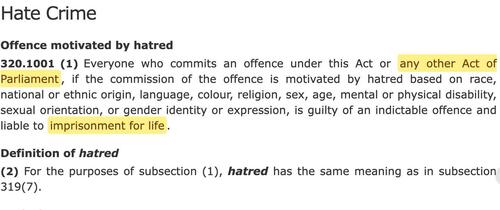 ANY OTHER ACT OF PARLIAMENT: Combining hate with any federal violation, no matter how minor, results in potential life sentences.
ANY OTHER ACT OF PARLIAMENT: Combining hate with any federal violation, no matter how minor, results in potential life sentences.
The “prior restraint” portion of C-63 describes the process by which a person can be punished preemptively if an informant convinces a judge that either a “hate propaganda offence” or the aforementioned “offence motivated by hatred” has a “reasonable” chance of occurring:
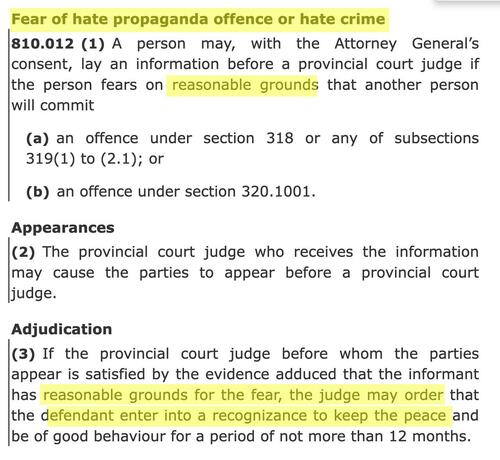 MINORITY REPORT: If authorities believe there are “reasonable grounds” to suspect a “hate propaganda” offense will occur, they will be able to hand out pre-emptive punishment.
MINORITY REPORT: If authorities believe there are “reasonable grounds” to suspect a “hate propaganda” offense will occur, they will be able to hand out pre-emptive punishment.
This clause might particularly affect a high-profile person like J.K. Rowling who’s already declared an intention to keep saying things deemed offensive to Canadians, who in 2017 passed a law (C-16) forbidding “gender identity” discrimination. Pardy, who described the 2017 measure as a “weaponization of human rights law,” says C-63 is like that act “on steroids.” This pre-crime provision includes a long list of potential punishments, ranging from house arrest, scheduled exit and entry from the home, ankle monitoring, and seizure of firearms. MacLean pointed out that this guts Canada’s Section 11 guarantee of presumption of innocence unless guilt is proven “beyond a reasonable doubt.” Again, a “reasonable” chance the crime will occur is sufficient to justify detention...
Subscribers to Racket can read the rest here...
-
-
Site: The Orthosphere
“We put our man into a pulpit, and we virtually tell him ‘Now you may stand there and talk to us for half-an-hour. We won’t interrupt you by as much as a word! And you shall have it all your own way!’ And what does he give us in return? Shallow twaddle, that, if it were addressed to you over a dinner-table, you would think ‘Does the man take me for a fool?’”
Lewis Carroll, Sylvie and Bruno (1889)*
My readers from time to time chide me for what they perceive as unseemly irreverence, although I must suppose they are my readers because they enjoy my irreverence towards holy cows other than their own. I do not say this to chide these readers. It is human nature to be amused until one’s own ox is gored. I say it to preface some words on the uses and abuses of irreverence.
My epigraph is taken from the first volume of Lewis Carroll’s last novel, Sylvie and Bruno, which unlike his novels about Alice is today very largely forgotten. The sentiment is expressed by Arthur, the protagonist in one of the novel’s plots, and it is one in a series of strictures on the state of the Anglican Church in Victorian England.
Readers must understand that Carroll was himself a very serious Christian, a fact that is almost always obscured or omitted in secular celebrations of the madcap surrealism of Alice’s Adventures in Wonderland (1865) and Through the Looking Glass (1871). He was born into a family of High-Church Anglicans, and appears to have died very much in the faith.
Although a High-Church Anglican, Carroll was keenly conscious that ritual tends to degrade into ritualism, and ritualism into a sham pageant of gorgeous spectacles and gross hypocrisy.
Carroll believed in a formal liturgy, but also believed that a liturgy of scripted motions very easily degrades into worship that only goes through the motions. I believe he was correct, for example, when he says that a liturgy that requires the congregation to kneel in prayer is a liturgy that will teach many in the congregation—especially the children—how to pretend they are praying.
Carroll made his observations on pretended prayer in the Preface to the second volume of Sylvie and Bruno, which was published four years after the volume in which Arthur made his caustic remark about preposterous sermons. Many readers apparently wrote to chide Carroll about this and other strictures, and he wrote the Preface to the second volume to clarify his position.
He first points out that a novelist must put into the mouths of his characters many opinions that are not his own, and therefore,
“I do not hold myself responsible for any of the opinions expressed by the characters in my book.”**
Carroll however admits that Arthur’s strictures on sermons are very nearly his own. A great many sermons (and homilies), then as now, are “shallow twaddle,” a pablum of motivational uplift and sophomoric psychology. As Carroll very pithily puts it:
“If it were addressed to you over a dinner-table, you would think “Does the man take me for a fool?”*
To prove his point, Carroll challenges his readers to name the text and treatment of the sermon that they heard the Sunday before. I challenge you to do likewise. Embarrassing, isn’t it? And I am asking you this question on Sunday.
But Carroll goes deeper, first suggesting the root of the problem and then explaining the deeper evil of sermons (and homilies) that are composed of “shallow twaddle.”
“In my opinion, far too any sermons are expected from our preachers; and, as a consequence, a great many are preached, which are not worth listening to; and, as a consequence of that, we are very apt not to listen.”**
As a man who keeps body and soul together by lecturing, I have always sympathized with priests and preachers who are expected to deliver one or more original public addresses every week. I do not like “shallow twaddle,” but I do not hold them altogether to blame for it. Push a dairy farmer to the wall and he will begin to water his milk.
Carroll’s explanation of the deeper evil of “shallow twaddle” is so true that every honest man will feel uneasy to see it expressed. Far too often the sermon (or homily) is the stage in a service where worshippers allow their minds to relax and wander. Not a few find the drone from the pulpit overpoweringly restful.
Carroll was, as I said, a High-Church Anglican or Anglo-Catholic. Thus he was part of the movement that began with the Tractarians and gave us the glorious gothic revival churches of the late nineteenth and early twentieth century. This movement was a reaction against (1) the lingering puritanism of Low-Church Anglicanism and (2) the crypto-Unitarian humanism of the eighteenth century. Like the Roman Catholic Church in the Counterreformation, High-Church Anglicans aimed to restore the sacramental and transcendent aspect of worship with gorgeous ritual.
Carroll was, by training and temperament, part of this movement, but like his fictional character Arthur, he saw,
“those ‘high’ services are fast becoming pure Formalism. More and more the people are beginning to regard them as ‘performances,’ in which they only ‘assist’ in the French sense.”*
To assist in the French sense is to attend. It is merely to be present, like the day-dreaming students who waste their time by merely attending one of my lectures. At best, it is to adopt the pose of a spectator and not a participant. As Carroll says in the Preface to volume two:
“Then, as to ‘Choristers,’ and all the other accessories—of music, vestments, processions, etc.—which have come, along with them, into fashion—while freely admitting that the ‘Ritual’ movement was sorely needed, and that it has effected a vast improvement in our Church-Services, which had become dead and dry to the last degree, I hold that, like many other desirable movements, it has introduced many new dangers.”**
The new dangers were that the symbolic windows on transcendence (this is what High-Church Anglicans mean by “sacramental”*) can all to easily become mere spectacles, mere sources of diversion, entertainment and aesthetic delight. As he goes on to say in the Preface to the second volume of Sylvie and Bruno:
“For the Congregation this new movement involves the danger of learning to think that the Services are done for then; and that their bodily presence is all they need contribute. And for the Clergy and Congregation alike, it involves the danger of regarding these elaborate Services as ends in themselves, and of forgetting that they are simply means, and the very hollowest of mockeries, unless they bear fruits in our lives.”
After detailing some examples from personal experience, Carroll laments,
“To me it is much as if I were to see a Bible used as a footstool.”
What Carroll (and Jesus) teaches is that we must focus on the fruit, and not on the means to that fruit. A stained glass window, to give an example, may be an excellent sacramental means to experience the transcendent. But it only works so long as we see through the stained glass window to something beyond. Once we begin to see only the window, and to reverence that window, we would do well to follow the example of the Puritans and pull it down.
This is because reverence for the means of worship is the definition of idolatry, and irreverence for reverence of the means of worship is therefore destruction of idols.
*) Lewis Carroll, Sylvie and Bruno (London: Macmillan, 1889), chap. 19.
**) Lewis Carroll, Sylvie and Bruno Concluded (New York: Macmillan, 1894), Preface.
***) “Now beauty is sacramental in essence, for it is ‘an outward and visible sign of a spiritual truth or spiritual experience . . .” Ralph Adams Cram, The Gothic Quest (New York: The Baker and Taylor Co., 1907), p. 277. -
Site: Zero HedgeIsraeli Attacks Intensify Across Gaza, Rafah Civilians Have Nowhere To GoTyler Durden Sun, 05/12/2024 - 17:15
Israeli tanks have moved into eastern Jabalia in northern Gaza following a night of intense bombardment, which has killed some 19 Palestinians and flattened residential blocks, according to health officials.
Israeli fire targeted ambulances near the camp's Unrwa clinic, Wafa news agency is reporting. The Israeli army said that the latest incursion on the camp was to prevent Hamas from "rehabilitating military capabilities" there.
 Via Reuters
Via Reuters
In other areas of Gaza, Israeli air strikes reportedly killed some 27 Palestinians overnight. In Rafah, 18 Palestinians were killed in air strikes, including several children, according to Wafa.
Wafa is also reporting that the continuing air strikes have killed dozens more in the past few hours, with 12 bodies arriving at Kamal Adwan Hospital in Beit Lahiya, in northern Gaza.
The director of the UN agency for Palestinian refugees, Sam Rose, has warned that Palestinians in Rafah are being instructed to evacuate to a nearby "expanded humanitarian area" which is already overcrowded and lacking in essential services.
In an interview with BBC news, Sam Rose explained that al-Mawasi is "essentially sand dunes on the Mediterranean coast that are crowded with hundreds of thousands of people" who have already been displaced.
"There is no water network, there is no infrastructure, sewage, sanitation," he said.
.@BarakRavid @axios sources suggest the Israelis are going to try to salami-slice Rafah to avoid crossing Biden's "red line": https://t.co/ND4EgQ4McI
— Sam Heller | سام هيلر (@AbuJamajem) May 10, 2024Here are some of the latest updates:
-
The Israeli military has intensified attacks across Gaza in the past 24 hours, with 27 Palestinians killed overnight, including several children in southern Rafah.
-
Israeli forces "carpet-bombed" Jabalia refugee camp in northern Gaza, killing and wounding several Palestinians, Wafa news agency is reporting. Residential houses and evacuation centres have been flattened. The death toll is currently unknown.
-
In the West Bank, Israeli forces have raided the Arroub refugee camp near Hebron on Sunday, Wafa is reporting.
-
UN Secretary-General Antonio Guterres renewed calls for an "immediate ceasefire".
-
UN agencies have warned that food supplies for distribution in southern Gaza will run out today.
-
Unrwa estimates that 300,000 Palestinians have fled Rafah in the last week, emphasising that displaced people have "nowhere safe to go".
-
-
Site: RT - News
Reports about a recent assassination attempt on Mohammed bin Salman appear to have been false – but that doesn’t mean it can’t happen
Recently, several media outlets reported an attack on the convoy of Saudi Crown Prince Mohammed bin Salman (MBS). However, these claims appear to have been false.
The video and information about burning cars in Riyadh emerged in a post by X (formerly Twitter) user Winter Intel, whose account analysis indicates an unreliable source. Later, the General Directorate of Civil Defense of Saudi Arabia reported an accident involving two cars, one of which had caught fire. The agency confirmed that there were no casualties.
Many Saudi journalists also debunked the news of the attack, calling it fake. Despite the widespread presence of fake news in the modern information space, questions remain about who could have an interest in spreading such rumors, and why. Could there indeed be an assassination attempt on MBS, and what might the reasons be?
Vision 2030: A great reformer for a nation of the future
Mohammed bin Salman, the Crown Prince of Saudi Arabia, initiated comprehensive reforms in the kingdom from the moment he assumed key positions of power. His ambitious reform program “Vision 2030” reflects a strategic plan to transform various aspects of the country’s economy, society, and culture. The primary economic goal is to reduce Saudi Arabia’s dependence on oil, and MBS has taken several critical steps toward this objective.
Sectors like tourism, entertainment, information technology, healthcare, industry, and mining are being developed. Saudi Arabia aims to increase the share of the non-oil sector in GDP from 16% to 50%. Privatization of state-owned enterprises is another vital element. The process of partial privatization of Saudi Aramco, the state oil company, has begun, as well as privatization of other public enterprises in various sectors.
At the same time, the Public Investment Fund (PIF), one of the largest sovereign funds in the world, with assets exceeding $620 billion, was established. The fund finances many strategic investments within and beyond the country, including the major project to build the futuristic NEOM megacity on the Red Sea coast. To stimulate the private sector, MBS has paid particular attention to developing small and medium-sized businesses, creating favorable conditions for entrepreneurship and foreign investment, including lifting restrictions on foreign ownership of businesses in the country.
MBS has also brought significant changes to Saudi Arabian social life. The most critical step was expanding women’s rights: they can now drive, attend sports stadiums, start their own businesses, and travel without a male guardian’s permission. Mandatory gender segregation at public events has also been abolished. Additionally, the establishment of the General Entertainment Authority has led to the emergence of concerts, cinemas, festivals, and other forms of entertainment previously strictly prohibited.
Read more No Saudi defense pact without Israel deal – White House
No Saudi defense pact without Israel deal – White House
Opening Saudi Arabia to foreign tourists is another key social reform. Thanks to the introduction of tourist visas, the country has for the first time become accessible to visitors not involved in a pilgrimage. In the cultural sphere, MBS is promoting development of arts and culture. The General Culture Authority was created, launching initiatives to support local artists and cultural projects. Special attention is also given to preserving Saudi Arabia’s cultural heritage, restoring historical sites and opening them to visitors.
Political reforms have also become an essential part of “Vision 2030.” In November 2017, MBS launched an anti-corruption campaign, arresting dozens of princes and businessmen. This campaign allowed significant sums to be returned to the state treasury, which were then used to finance key reforms. The government service reform introduced new standards for civil servants and improved the efficiency of the government apparatus.
Despite the complexity and scale of the changes, MBS continues to advance Vision 2030, striving to make Saudi Arabia more progressive, modern, and sustainable in the future.
“Challenges of 2030”: What problems does MBS face?
MBS’ reforms are already changing the face of Saudi Arabia, but they have sparked strong reactions, both domestically and internationally. Vision 2030 is an ambitious plan to transform Saudi Arabia but the implementation of the program faces significant challenges.
Despite notable achievements, MBS’ reforms have drawn criticism from both inside the country and abroad. The anti-corruption campaign was accompanied by harsh repression of dissent. The November 2017 move on princes and businessmen returned significant sums to the state. However, this step by MBS was also seen as an attempt to eliminate political opponents, consolidate his power, and suppress dissent.
The arrests of activists and journalists have restricted freedom of speech and political participation, provoking strong criticism from international human-rights organizations. The murder of journalist Jamal Khashoggi in the Saudi consulate in Istanbul in 2018 cemented a negative image of MBS in the eyes of the global community. This crime became a symbol of a brutal suppression of opposition, and several Western countries imposed sanctions on Saudi officials suspected of involvement in the killing.
The UN and international human rights organizations like Amnesty International and Human Rights Watch have raised concerns and leveled criticism at MBS for the arrests of journalists, bloggers and activists, including female activists fighting for women’s rights such as Loujain al-Hathloul. Strict laws on insulting religion and the state, mistreatment of prisoners, and the kingdom’s use of the death penalty continue to attract global attention.
Another source of international criticism is the war in Yemen. Saudi Arabia, led by MBS, headed a coalition against the Houthis in 2015. The conflict has led to massive civilian casualties and a humanitarian crisis in Yemen. MBS was accused of waging a war that disproportionately targeted civilian infrastructure, and of blockading Yemen, which led to widespread famine.
Sharp economic and social changes have also triggered resistance within Saudi Arabia. Despite efforts to develop non-oil sectors, oil remains a significant source of the country’s revenue. The recent sharp decline in global oil prices has exposed the vulnerability of the kingdom’s economy. Vision 2030 aims to reduce Saudi Arabia’s dependence on oil revenue, but economic diversification has proven to be a challenging task.
Read more Saudi Arabia denies shooting down Iranian drones destined for Israel
Saudi Arabia denies shooting down Iranian drones destined for Israel
The reforms have faced the most resistance from religious and conservative circles. Most significantly, expanding women’s rights was met with fierce criticism from the religious establishment and conservative parts of the population, who see such reforms as a threat to traditional Islamic values.
These problems are not without historical parallels to the reforms of King Faisal, who also faced challenges in modernizing Saudi Arabia in the mid-20th century. King Faisal, the uncle of MBS, also carried out reforms that changed Saudi Arabia. He sought to reduce the country’s dependence on oil by developing infrastructure and non-oil sectors of the economy. In the 1960s and 1970s, he introduced a mandatory education system for girls despite conservative opposition, and sought a more modern, open Saudi Arabia. However, he was shot and killed by his nephew, although the real reasons behind this act remain unclear.
However, there are significant differences between the reforms of MBS and King Faisal. King Faisal acted cautiously and gradually, avoiding abrupt changes, while MBS aims for rapid results, often causing social upheaval. King Faisal was more diplomatic in his approach to opponents, whereas MBS employs harsh methods to suppress adversaries of reform. The anti-corruption campaign and its mass arrests have become part of MBS’ strategy to consolidate power, which critics see as authoritarian.
Rising external tensions
The United States remains Saudi Arabia’s primary strategic partner, but relations between the two countries have often been strained due to MBS’ policies. After the Khashoggi murder, the US Congress and the Biden administration sharply criticized the crown prince. The CIA linked this crime directly to MBS, which led to sanctions against several Saudi officials and complicated relations with Washington. The US also expressed concern over the war in Yemen. President Biden announced the end of US support for the Saudi campaign and reviewed arms supplies. An additional source of tension was the October 2022 OPEC+ decision led by Saudi Arabia to cut oil production, which raised energy prices and angered the Biden administration.
Saudi Arabia and Iran have traditionally been regional rivals, supporting opposing sides in conflicts in Yemen, Syria, and Lebanon while also competing for influence in the Persian Gulf. The severing of their diplomatic relations in 2016 and mutual accusations of destabilizing the region heightened enmity between Riyadh and Tehran. Saudi Arabia criticizes Iran’s nuclear program and supports sanctions against Tehran, fearing the possible development of Iranian nuclear weapons. However, in March 2023, with China’s help, the two nations agreed to restore diplomatic relations, opening a new chapter in the Riyadh-Tehran dialogue and promising a potential reduction in regional tensions, though the fundamental causes of competition and rivalry remain.
The United Arab Emirates (UAE) has traditionally been a close partner of Saudi Arabia in the region, but the ambitions of its leader, Mohammed bin Zayed (MBZ), create friction. The UAE seeks to become a regional economic hub, which creates competition between Dubai and Riyadh. Saudi Arabia requires international companies to move their headquarters to Riyadh to secure contracts in the kingdom, which displeases Dubai. In Yemen, Saudi Arabia and the UAE fight the Houthis together but pursue different goals: the UAE supports the Southern Transitional Council (STC), which seeks southern Yemen’s independence, while Saudi Arabia advocates a unified Yemen. In relations with Israel, the UAE normalized ties through the Abraham Accords in 2020, promoting regional cooperation, while Saudi Arabia remains hesitant to follow suit due to concerns over internal backlash.
Read more What the Arab world thinks of Russia’s military operation against Ukraine
What the Arab world thinks of Russia’s military operation against Ukraine
Saudi Arabia and Israel do not have official diplomatic relations, but against the backdrop of common opposition to Iran, both states are cautiously moving towards rapprochement. Tehran remains the main adversary for both countries, providing a basis for informal security cooperation. Israel offers Saudi Arabia support in countering the Iranian threat. In the framework of the Abraham Accords, several Arab countries have normalized relations with Israel. Saudi Arabia has yet to grant official recognition, but negotiations were actively ongoing until the conflict in Gaza erupted in October 2023
Relations between Saudi Arabia and Türkiye improved after a period of tension over the Khashoggi murder. Türkiye seeks to strengthen its influence in the Middle East, competing with Saudi Arabia. Earlier, Ankara had strongly criticized Riyadh’s actions in Yemen and its blockade of Qatar. In 2022, MBS visited Turkey, and the two countries agreed to improve relations. This demonstrates MBS’s pragmatic approach to cooperation, even with those who have criticized him in the past.
In June 2017, Saudi Arabia, led by the UAE, Egypt, and Bahrain, imposed a blockade on Qatar, accusing it of supporting terrorism and of maintaining close ties with Iran. This created deep regional divisions and strengthened Türkiye’s and Iran’s influence over Qatar. However, in January 2021, Riyadh and Doha signed an agreement to restore relations and ended the blockade. Nevertheless, mutual distrust remains.
In the changing global world, Saudi Arabia faces difficulties as MBS seeks to pursue a sovereign and diversified foreign policy. Western criticism often stems not only from human-rights issues and the crown prince’s harsh governance methods but also from his desire to develop relations with Russia and China. Riyadh sees China as a strategic partner in trade and investment. Saudi Arabia and Russia cooperate within OPEC+ on oil-price regulation. Riyadh maintains contacts with Moscow despite Western isolation of Russia due to the war in Ukraine.
MBS’ domestic and foreign policies, despite complicated relations with many countries and forces, reflects his desire to strengthen Saudi Arabia’s position as a regional leader and to reshape the kingdom. However, his harsh methods and uncompromising struggle against the opposition have intensified criticism from global and regional players, creating new challenges for the crown prince. Therefore, potential assassination attempts on the de-facto leader of modern Saudi Arabia may not be fake in the future.
His reforms are opening a new chapter in Saudi Arabian history, but they also highlight the difficulty of modernizing the kingdom amidst contradictions and resistance from various segments of society. The Vision 2030 program remains an ambitious attempt to make the kingdom more progressive, modern, and sustainable in the future, despite the many challenges on this path. After all, not everyone is interested in a strong and sovereign Saudi Arabia.
-
Site: Zero HedgeWatch: Pelosi Dismantled In Real Time In Masterclass On PopulismTyler Durden Sun, 05/12/2024 - 16:40
Two weeks ago, former House Speaker Nancy Pelosi was thoroughly savaged during a debate at Oxford University over the question of whether populism is a "threat to democracy." In case you missed it, read on as it's making the rounds. If you have 14 minutes to spare, jump right in:
Opening the case for the left was Rachel Haddad, Secretary of the Oxford Union. She argued that populist leaders like Donald Trump and Nigel Farage pose a threat to democracy, and are not a "new generation of geniuses" who can find simple solutions to longstanding, complex problems.
Pelosi closed the debate for the proposition, defining populism as an "ethno-nationalist populism, generated by an ethnic negativity to immigrants, people who are different from them and the rest" (so, 'they're racists!').
Speaking against the motion were Union committee members Sultan Kokhar (Chair of Consultative Committee) and Oscar Whittle (Director of Research), as well as former Mumford & Sons lead guitarist, Winston Marshall - now a podcaster for The Spectator - who got into an exchange with Pelosi during parts of his speech.
Marshall started out by saying:
"Words have a tendency to change meaning when I was a boy, "woman" meant "someone who didn't have a cock."
Populism has become a word used synonymously with "racists." We've heard "ethno-nationalist," with "bigot," with "hillbilly," "redneck," with "deplorables."
Elites use it to show their contempt for ordinary people."He then noted that Barack Obama, while still president, tried to frame he and Bernie Sanders as actual populists vs. Donald Trump, who 'doesn't care about working people.'
But then, "If you watch Obama's speeches after that point, more and more recently, he uses the word "populist" interchangeably with "strong man," with "authoritarian." The word changes meaning, it becomes a negative, a pejorative, a slur."
"To me, populism is not a dirty word. Since the 2008 crash and specifically the trillion-dollar Wall Street bailout, we are in the populist age, and for good reason. The elites have failed," Marshall continued.
He then got into it with Pelosi after drawing a parallel between January 6th and June 2020, saying: "I'm sure Congresswoman Pelosi will agree that the entire month of June 2020, when the federal courthouse in Portland, Oregon was under siege, and under insurrection by radical progressives, those too were dark days for America."
To which Pelosi shot back, "You are not. There is no equivalence there," adding "It is not like what happened on January 6, which was an insurrection incited by the president of the United States."
Read on for Marshall's complete masterclass in populism (transcript courtesy of RealClear Politics).
My point, though is that all political movements are susceptible to violence, and indeed insurrection. And if we were arguing that fascism was a threat to democracy, I'd be on that side of the House.
Indeed, the current populist age is a movement against fascism. I've got quite a lot to get through.
Populism as you know, is the politics of the ordinary people against an elite, populism is not a threat to democracy. Populism is democracy, and why else have universal suffrage, if not to keep elites in check?
Ladies and gentlemen, given the success of Trump, and more recently, Javier Milei taking a chainsaw to the state behemoth of Argentina's bureaucratic monster, you'd be mistaken for thinking this was a right-wing populist age, but that would be ignoring Occupy Wall Street. That would be ignoring Jeremy Corbyn's "for the many, not the few," that would be ignoring Bernie against the billionaires, RFK Jr. against Big Pharma, and more recently, George Galloway against his better judgment. Now all of them, including Galloway, recognize genuine concerns of ordinary people being otherwise ignored by the establishment.
I'm actually rather surprised that our esteemed opposition, Congressman Pelosi, is on that side of the motion. I thought the left was supposed to be anti-elite. I thought the left was supposed to be anti-establishment today, particularly in America, the globalist left have become the establishment. I suppose for Miss Pelosi to have taken this side of the motion, she'd be arguing herself out of a job.
But it's here in Britain, where right and left populists united for the supreme act of democracy, Brexit. Polls have showed the number one reason people voted for Brexit was sovereignty, for more democracy.
What was the response of the Brussels elite? They did everything in their power to undermine the Democratic will of the British people and the Westminster elite were just as disgraceful. As we've heard, David Cameron called the voters "fruitcakes, loonies and closet racists." The liberal Democrats did everything they could to overturn a democratic vote. Keir Starmer campaigned for a second referendum. Elites would have had us voting and voting and voting until we voted their way. Indeed, that's what happened in Ireland and in Denmark.
Let's look at some of the other populist movements. The Hong Konger populist revolt is literally called the Pro-Democracy Movement. In the Farmer revolts from the Netherlands to Germany, France, Greece, to Sri Lanka, farmers are taking their tractors to the road to protest ESG policy that's floated down to us from those all-knowing, infallible elites of Davos. The trucker movement in Canada became anti-elitist when petty tyrant Prime Minister Justin Trudeau froze their bank accounts, not the behavior of a democratic head of state. The Gilets Jaunes France, ULEZ in London, working people protesting policy that hurt them. And how are they treated? They're called conspiracy theorists. They're called far-right, by the mayor as well.
Ladies and gentlemen, populism is the voice of the voiceless. The real threat to democracy is from the elites. Now don't get me wrong, we need elites. If President Biden has shown us anything, we need someone to run the countries. When the president has severe dementia, it is not just America that crumbles, the whole world burns.
But let's examine the elites. European corporations spend over €1 billion a year lobbying Brussels, U.S. corporations spend over $2 billion a year lobbying in DC, and two-thirds of Congress receive funding from pharmaceutical companies. Pfizer alone spent $11 million in 2021. They made over $10 billion in profit. No wonder then that 66% of Americans think the is rigged against them for the rich and the powerful.
And by the way, we used to have a word for when big business and big government were in cahoots. And I think any students here of early 20th-century Italian history will know what I'm talking about.
What about Big Tech? Throughout the pandemic, Biden's team, the FBI, and the Department of Homeland Security colluded with Big Tech in censoring dissenting voices. Not kooky conspiracy theorists, people like Dr. Jay Bhattacharya, the Stanford epidemiologist, people like Harvard scientist Martin Kulldorf, people spreading true information, not misinformation, true information at odds with the government narrative.
Need I remind you, democracy without free speech is not democracy.
This was a direct breach by the way of the First Amendment. Before COVID, Intelligence services colluded with Big Tech to have Trump suspended off Twitter. Yes, the same platform which hosted the Taliban and Ayatollah "Death To Israel" Khomeini. They thought the president crossed the line when he tweeted on Jan 6 quote, "Remain peaceful. No violence! Respect the law and our great men and women in blue." That's a quote.
You may be thinking now that Trump is a populist. You are right. He didn't accept the 2020 elections and he should have. So should Hillary in 2016. So should Brussels, and so should Westminster in 2016. And so too should Congresswoman Pelosi, instead of saying the 2016 election was quote, "hijacked."
PELOSI: That doesn't mean we don't accept the results, though!
WINSTON MARSHALL: What about the mainstream media? Let me read you some mainstream media headlines. The New Yorker the day before the 2016 election, "The Case Against Democracy." The Washington Post, the day after the election, "The Problem With Our Government Is Democracy." The LA Times, June 2017, "The British Election Is A Reminder Of The Perils Of Too Much Democracy." Vox, June 2017, "Two eminent political scientists say the problem with democracy is voters." New York Times, June 2017, "The Problem With Participatory Democracy Is The Participants."
Mainstream media elites are part of a class who don't just disdain populism, they disdain the people. If the Democrats had put half their energy into delivering for the people, Trump wouldn't even have a chance in 2024. He shouldn't, he shouldn't have a chance. You've had power for four years. From the fabricated Steele dossier, to trying to take him off the ballot in both Maine and Colorado, the Democrats are the anti-Democrat party. All we need now is the Republicans to come out as the pro-Monarchist party.
Ladies and gentlemen, populism is not a threat to democracy, but I'll tell you what is. It is elites ordering social media to censor political opponents. It's police shutting down dissenters, be it anti-monarchists in this country or gender-critical voices here, or last week in Brussels, the National Conservative Movement.
I'll tell you what is a threat to democracy. It's Brussels, DC, Westminster, the mainstream media, big tech, big Pharma, corporate collusion and the Davos cronies. The threat to democracy comes from those who write off ordinary people as "deplorable." The threat to democracy comes from those who smear working people as "racists." The threat to democracy comes from those who write off working people as "populists."
And I'll say one last thing. This populist age can be brought to an end at the snap of a finger. All that needs to be done is for elites to start listening to, respecting, and God forbid, working for ordinary people. Thank you.And of course, being Oxford, the Union voted for 'populism bad' - with 177 members voting for the motion, and 68 voting against.



